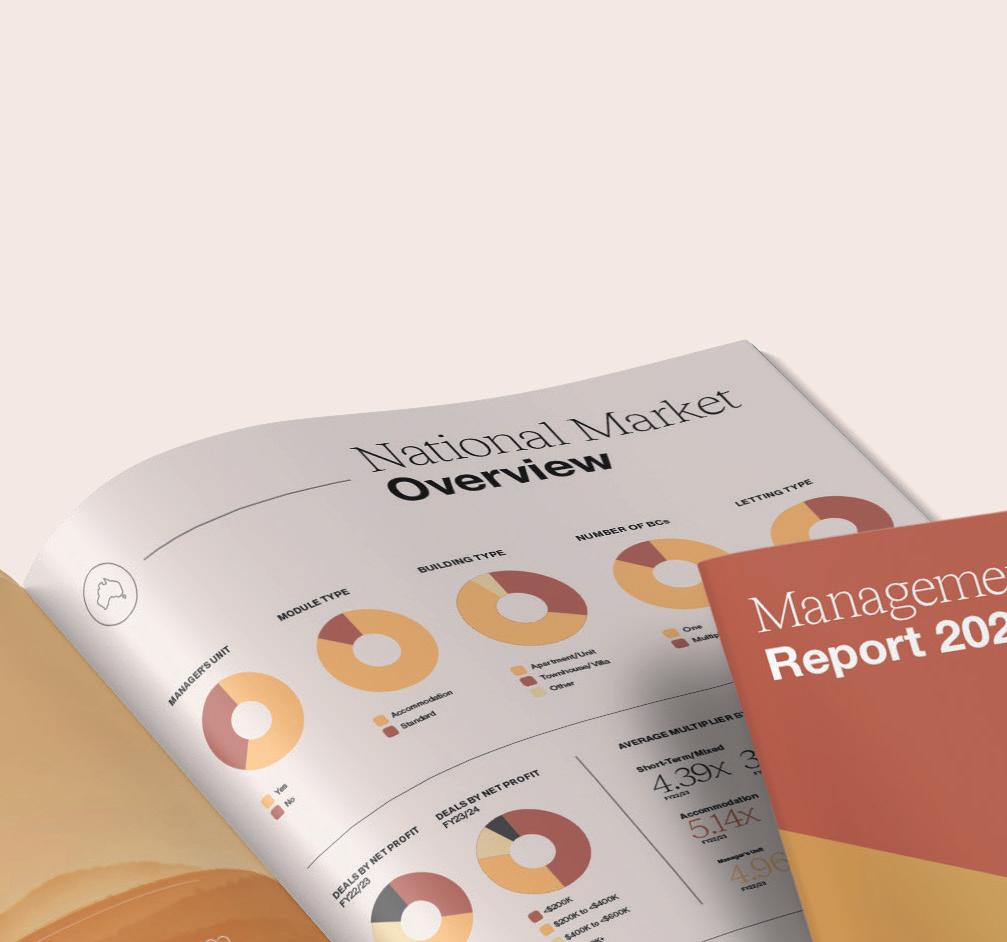








































































The views and images expressed in Resort News do not necessarily refl ect the views of the publisher. The information contained in Resort News is intended to act as a guide only, the publisher, authors and editors expressly disclaim all liability for the results of action taken or not taken on the basis of information contained herein. We recommend professional advice is sought before making important business decisions.
The publisher reserves the right to refuse to publish or to republish without any explanation for such action. The publisher, it’s employees and agents will endeavour to place and reproduce advertisements as requested but takes no responsibility for omission, delay, error in transmission, production defi ciency, alteration of misplacement. The advertiser must notify the publisher of any errors as soon as they appear, otherwise the publisher accepts no responsibility for republishing such advertisements. If advertising copy does not arrive by the copy deadline the publisher reserves the right to repeat existing material.
Any mention of a product, service or supplier in editorial is not indicative of any endorsement by the author, editor or publisher. Although the publisher, editor and authors do all they can to ensure accuracy in all editorial content, readers are advised to fact check for themselves, any opinion or statement made by a reporter, editor, columnist, contributor, interviewee, supplier or any other entity involved before making judgements or decisions based on the materials contained herein.
Resort News, its publisher, editor and sta , is not responsible for and does not accept liability for any damages, defamation or other consequences (including but not limited to revenue and/ or profi t loss) claimed to have occurred as the result of anything contained within this publication, to the extent permi ed by law.



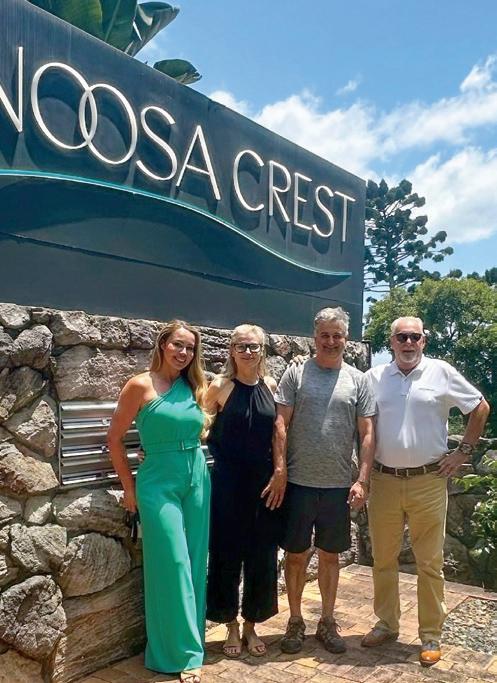


Advertisers and Advertising Agents warrant to the publisher that any advertising material placed is in no way an infringement of any copyright or other right and does not breach confi dence, is not defamatory, libellous or unlawful, does not slander title, does not contain anything obscene or indecent and does not infringe the Consumer Guarantees Act or other laws, regulations or statutes. Moreover, advertisers or advertising agents agree to indemnify the publisher and its’ agents against any claims, demands, proceedings, damages, costs including legal costs or other costs or expenses properly incurred, penalties, judgements, occasioned to the publisher in consequence of any breach of the above warranties. It is an infringement of copyright to reproduce in any way all or part of this publication without the wri en consent of the publisher.
© 2024-2025
As 2024 winds down, it’s the perfect time to take stock of what has been a jam-packed and rewarding year. End-of-year celebrations off er a moment to appreciate the milestones we’ve achieved and the relationships we’ve strengthened. I want to take this opportunity to express my heartfelt thanks to all our readers, writers, contributors, and clients. Your support and involvement make Resort News what it is today.
I couldn’t let this note pass without acknowledging the amazing team that helps me make Resort News happen every single month. Most of you will know how crucial Stewart Shimmin and Gavin Bill are to the success of this magazine.




Mandy Clarke, Editor editor@accomnews.com.au
We are also lucky to have the brilliant Grantlee Kieza OAM contributing his writing talents. Behind the scenes, Richard McGill’s creativity ensures every issue looks incredible, and let’s not forget our eagleeyed proofreaders, Gemma








Easton and Dee Dawson, who help keep everything polished and perfect. You’re all absolute legends—thank you!
A special thank you also goes out to ARAMA and its leaders, Trevor Rawnsley and Chris Podmore, for their tireless work supporting the MLR industry. ARAMA’s recognition of our magazine’s importance by awarding Patrick and me lifetime ARAMA membership earlier this year was an unexpected honour that we will always deeply treasure.
This issue features a fantastic line-up of stories, particularly an interview with Ashtyn Leary, a young dynamo who is making waves in Gold Coast management rights. Residing in a scheme myself, I couldn’t agree more with John Mahoney’s simple yet profound insight in his column:
“Management rights are all about relationships and cleanliness.” These words ring true across the industry for all stakeholders. We also caught up with Stephanie and Chris Brown, who have been managing the Marrakesh Resort in Surfers Paradise since 2022, and they shared their journey of fostering community and excellence. Plus, don’t miss our special report on management rights in New South Wales and Victoria, which explores the latest trends and insights in these key markets.
As we look ahead to 2025, I hope you find some time to relax, recharge, and enjoy the festive season with loved ones. From all of us at Resort News, we wish you a very Happy Christmas and a joyful holiday season. Here’s to making 2025 our best year yet!
Warm regards, Mandy









By Trevor Rawnsley, CEO, ARAMA
ARAMA has scored some important victories for the management and letting rights (MLR) industry in the last few years, particularly in the battle to preserve long-term agreements in Queensland and NSW.
If it wasn’t for ARAMA’s efforts, everyone in the industry would be sitting on three-year agreements now and the re-sale value of their businesses would have dwindled considerably, by some estimates as much as 70 percent.
Membership of ARAMA is vital to maintain the strength of our industry and retain the ground we have gained in dealing with legislators. Everyone involved in MLR needs to stay engaged with ARAMA because as well as representation to protect the industry we can also identify the real risks to your business.
One of the key components of the MLR business model has always been that the owner of the management rights at a scheme is part of the residential community, usually living onsite as an active and highly visible member of that community.
But we are now seeing a trend for managers to live off-site, and to focus more on the caretaking business than a role as an allround residential manager.

Decoupling has
for the whole business of management and letting rights
That puts a strain on the relationships within the scheme’s community, and lot owners in particular perceive that the owner of the management and letting rights is no longer “one of us.”
We are hearing more and more about prospective purchasers and vendors pushing for decoupling, that is taking the real estate component away from the business so that the purchaser does not need to buy a unit in a complex, just the letting and caretaking businesses or in some cases just the caretaking only.
The soaring cost of real estate has brought this on.
Removing the real estate value from an MLR business can increase the proportionate value of the business and make it seem more attractive to today’s buyer.
Many sales brokers are pushing decoupling for good reasons. We understand that sales brokers and others are keen to achieve a sale today however ARAMA is interested in what will happen over the horizon and our message is to beware of this new trend.
Decoupling has consequences for the whole business of management and letting rights, and if the trend continues it could threaten the very viability of long term agreements in MLR.
Even a leading broker who shall remain nameless says decoupling can be “very detrimental” to the industry in the longer term.
“As unit owners are seeking to remove the requirement to reside onsite, these too are weakening the industry in the lower end of the price ranges,” he said.
“Management rights have traditionally been about equity, being part of the community, having a greater interest and a stronger vetting of tenants compared to external agents as they live in the complex.
“With decoupling,” he said, “it is important to note that unless you own a lot in the complex, you are unable to present a motion for a top-up of agreements and you need to be a lot owner or have a lot owner put a motion forward for consideration on your behalf.”
There are five things that could threaten the future of long term agreements:
• Decoupling.
• Not living onsite.
• Caretaking-only contracts.
• Not connecting with your community.
• Not being an ARAMA member and thus not investing in the long-term viability of our industry.
In isolation one of these may not have a major impact on the capital value of your business, however when a number of these exist in the same scheme it can prove devastating to the relationship with the body corporate and the eventual capital value of the business.
If the industry moves closer to adopting some or all of these five things, then the industry will be under even greater pressure to maintain the fundamental advantages of the MLR business model.
Decoupling is becoming common in places such as Queensland’s Sunshine Coast
where the cost of property has gone through the roof.
A veteran management rights lawyer whose name is also suppressed says while he totally understands why decoupling is becoming more common around places such as Noosa, he doesn't like it.
“I think it detracts from the basis of management rights that we have always tried to sell – and that is the work of residential managers,” he said.
“I think there are some buildings that will always have an onsite manager purely by virtue of their size, particularly holiday buildings.
“We are seeing in some of these bigger buildings – Mirvac being a classic example – where the developer will build an office for the manager, but they don’t have to reside there.
“If you go back five years or even longer you could justify buying a manager’s unit based on the income being derived.
“But it just got out of kilter as the prices of the real estate have trebled, in some cases even more, but the income has probably only gone up maybe 30 to 40 percent.
“So, it's very hard to justify the purchase of a unit at that price based on the income that the business is generating.”
He said that in many decoupled management rights, there were generally obligations in the agreement that the new managers had to be onsite for a certain number of hours, and certain obligations to return to the site in the event of emergencies.
“Sometimes you might even specify that they have to be able to attend within a certain period of time whether that be 10 or 20 minutes or something like that for emergencies,” he said.
“But one of the problems with this is that it takes away one of the real advantages we've always sold with management rights, and that is that you've got a fellow unit owner living and working onsite. That’s particularly beneficial for various reasons including immediate availability.
“There's an intangible benefit to a building where living onsite
is concerned, and we've always sold the idea of a residential manager as being one of the big benefits of management rights.”
He said buyers who chose not to live onsite were losing the direct daily relationship and contact with unit owners.
“That daily contact is important when you want to go for a top-up or some kind of variation, so it makes it harder to get them.”
Another leading lawyer, said the first thing any buyer or seller thinking about decoupling needed to do was to check the agreements and bylaws thoroughly to see if a specified manager’s unit could be sold, and if there was a stipulation that the manager had to live at the property.
“You need to have the committee on the journey with you,” he said.
“If you try uncoupling the real estate from the management rights without the committee being on the bus it's going to be a difficult process.
“And if you don't manage expectations around your job – about being on call for emergencies for instance – it can become really untidy, really quickly. The moment the committee says, ‘we're not getting what we paid for’, it's fatal.
“There is obviously an economic reason to remove the real estate from the management rights, but I think it then really takes away what management rights was about at the start, which is the person living onsite who is there building relationships with the body corporate and the owners.
“If you live off-site, in a letting sense, you’re no different to the agents down the road except that you've got them all in the one building and you've got a relationship with the body corporate – but functionally you're not there.
“The whole idea of a resident manager is that you’re actually a resident – and it’s still called a Resident Letting Agents Licence. There’s a degree of accountability when the manager is living at the property and other residents knock on the door. That’s not a bad thing for the industry.”
A leading financier said despite the trend for decoupling he
believed that “the own a unit / live onsite” example still underpinned the validity of the management rights model.
Another leading lawyer who operates in Queensland and all other states said depending on the caretaking and letting agreements many new buyers of management rights were opting to rent in the same building rather than buy a unit. “I think that's a really good compromise,” he said.
“We are seeing more and more managers wanting to buy the business but not the unit. Some want to buy the business and not even live onsite but I shake my head at that because it goes against the whole foundation of management rights and the idea of a resident manager.
“What’s the point of having long-term caretaking contracts if the manager is not on-site to deal with the lift that’s out of order or the repairs that have to be done urgently?”
The drift to a more corporatised model can be positively impacted by the corporate
entity ensuring that they have a continued presence such as an employee living and working in the scheme and considered by the body corporate to be part of the community.
Banks have always found management rights attractive investments because they have both business value and real estate value.
When you start breaking that up you start to water down the beneficial aspects of management rights or at least the perception that an investor has skin in the game because he owns real estate in the building.
It doesn't mean off-site management can't work, but anyone wanting to uncouple the real estate component from a management rights business must know that it comes with a warning.
As soon as you step out of that scheme, you are likely to affect the good relationship that you have with your clients.
And you could end up killing the goose that laid the golden egg.












By Ben Ashworth, Senior Associate, Small Myers Hughes Lawyers
The by-laws for a strata scheme are often an essential component of the onsite manager’s business. They can add significant value to the business by granting exclusive rights to the onsite manager.
It is very common for the by-laws in a strata scheme to be overly generic or slightly misaligned with what the owners want and need. This can often be attributed to the fact that the bylaws are drafted before the strata scheme is built. Over time, small issues in the by-laws can test patience and eventually become real problems that need fixing.
Updating the by-laws to better reflect the needs of the owners and the strata scheme is generally beneficial for all owners, occupiers, and the onsite manager. Unfortunately, this is not always the case.
Sometimes, when the committee has an issue with the onsite manager, or when the committee is being guided by an advisor with a negative opinion of onsite managers, an update of the by-laws becomes an opportunity to undermine the rights of the onsite manager by stealth. Over the years, I have seen multiple instances where changes to the by-laws (and management statements) have resulted in onsite managers losing rights

An update of the by-laws becomes an opportunity to undermine the rights of the onsite manager by stealth
essential to the operation and value of their business.
These are scenarios where the committee has arranged for the by-laws to be overhauled and updated to achieve a number of reasonable and necessary changes, but at the same time, they have included changes that specifically target the onsite manager’s business.
Changes to the by-laws can have a variety of negative effects on the onsite manager, such as:
• A reduction in the maximum length of caretaking and letting agreements.
• Limiting the types of lettings that can be conducted within the strata scheme.
• Reducing the onsite manager’s access to and rights to use common property assets and areas.
• Limiting the onsite manager’s ability to regulate and control the use of common property
areas and equipment by owners and occupiers.
• Loss of rights to display signs.
• Increasing the voting thresholds required to approve motions relating to onsite manager matters.
• Adding red tape and compliance requirements.
Onsite managers need to be aware that just because the committee may have told owners the proposed changes to the by-laws are “just an update and nothing is really changing,” this doesn’t mean there won’t be significant changes that could have a large impact on the onsite manager’s business.
I cannot emphasise enough that when an onsite manager’s strata scheme proposes to change the by-laws, that manager must carefully review all the proposed changes before they are voted on. The cliché stories are true: people really do sneak in very
significant and substantial changes by burying them under pages of documents they are confident the onsite manager won’t read. To make matters worse, onsite managers often vote in favour of these by-law changes, not realising they have undermined their own business and effectively waived any opportunity to contest the changes in the future.
Onsite managers should also be aware that the changes to the by-laws I am highlighting in this article often become sleeper issues, only surfacing when the onsite manager attempts to sell their business. When a buyer raises a by-law issue as a reason to terminate a sale, it comes as a distressing shock to realise there is a fundamental flaw, voted in favour of by the manager, that could kill the sale.
Don’t let this happen to you. Ensure all changes to the bylaws in your strata scheme are reviewed to confirm they will not harm your business.

Liability limited by a scheme approved under Professional Standards Legislation
Disclaimer – This article is provided for information purposes only and should not be regarded as legal advice.




Commercial Painting

Open Space



Building Projects



Signage Solutions
Scan to find out more
Electrical
With conciliation, issues can be resolved quicker and parties provided with effective outcomes
History shows most disputes within community title schemes arise from a lack of communication or knowledge of body corporate legislation.
However, they can be resolved by both parties talking through their issues and gaining a better understanding of body corporate legislation and how it relates to their dispute. While conciliation is an avenue to resolving disputes, it can also be a valuable opportunity to inform and educate parties about their roles and responsibilities under the legislation.
Disputes about general meeting outcomes are often resolved through adjudication, although conciliation can also be an option.
The key vision of the Office of the Commissioner for Body Corporate and Community Management (BCCM) is to inform, educate and resolve, and with conciliation, issues can be resolved quicker and parties provided with effective outcomes.
look like?
Dispute resolution through our office is outcome based.
This means an applicant cannot apply for conciliation or adjudication with an outcome that simply says, “I want the issue fixed”.
The applicant must state the action that will resolve the problem.
The applicant must also provide evidence that they have attempted to resolve their issue and requested an outcome (selfresolution) from the respondent before lodging an application.
This usually includes submitting a motion asking for their specific outcome and providing the minutes showing the outcome of the motion as evidence.
1. An issue (dispute) occurs between two parties within the body corporate. Section 228 of the Body Corporate and Community Management Act 1997 (the Act) establishes the types of disputes our office can deal with.
2. The parties are unable to resolve the dispute themselves.
3. An application is lodged with us.
4. The application is assessed and, if considered appropriate for conciliation and within our jurisdiction, referred to a conciliator.
5. The conciliator works with the parties to discuss the issues and inform them about the relevant legislation. If the parties agree on a resolution, the conciliator drafts them an agreement to sign.
6. If the agreement does not resolve the dispute, the applicant may then lodge an adjudication application.
7. An adjudication application is assessed and, if within our jurisdiction, referred to an adjudicator to make an order.
Before submitting a dispute resolution application, it is important to consider the outcomes you are seeking and what action you want the committee or body corporate to take.
Disputes about motions considered at general meetings are one of the top five issues disputed in our office.
Applicants claim there has been a mistake with the process that has affected the outcome, or a breach of the legislation has occurred due to the motion passing or not passing.
Regardless of the reason, applicants need to try and resolve the issue with the body corporate before lodging a dispute application.
If conciliation is deemed appropriate, both parties need to come to the session prepared to discuss the issue.
They can offer solutions and make decisions that may resolve the dispute.
The committee is restricted in making some decisions on behalf of the body corporate, so that needs to be considered when determining the appropriateness of the application for conciliation.
Committee members who attend need to be authorised by the committee to make decisions. Section 252G of the Act allows the committee members representing the body corporate to make decisions on behalf of the body corporate in conciliation.
Refer to our webpage, Committee’s role, for further information on restricted issues.
Applications lodged about a motion passed at a general meeting where an applicant believes the outcome would be unlawful, unenforceable, or not reasonable are lodged as adjudication applications.
In these instances, the committee representatives are unable to override a general meeting decision in the conciliation session.
However, the committee could agree to call and hold a new general meeting.
At this general meeting, the body corporate can vote to amend or revoke a previous decision, as well as consider new motions.
If conciliation would be the preferred option to try and resolve the dispute, the applicant would need to demonstrate they have asked for a general meeting to be called but their request was refused.
The applicant also needs to explain how the refusal to call a general meeting breaches the Act.
Applying for conciliation to resolve disputes about passed motions at a general meeting can work well for smaller bodies corporate, for example, six lots or less.
Section 252E of the Act allows a conciliator to choose who attends the conciliation.
Depending on the size of the scheme, a conciliator can choose to invite all members of the body corporate to attend the conciliation session if their participation would help resolve the dispute.
As explained previously, the committee cannot change or overturn general meeting decisions.
Usually, a new general meeting is required to be called where the committee may call for the motion to be reconsidered.
If the committee refuses to call another general meeting, this may be one of the outcomes sought in the conciliation application.
The applicant also needs to explain how the refusal to call a general meeting breaches the Act.
If a general meeting is called and held, the body corporate can vote to amend or revoke a previous decision, as well as consider new motions.
Even though overturning a general meeting decision is not something a committee can do, the decision to call a general meeting is within the scope of their functions.
Therefore, conciliation is a viable option to help parties agree on their next steps.
A motion that fails at a general meeting is different. Unlike passed motions, where in most cases adjudication is the most appropriate course of action, conciliation can be useful for resolving these types of disputes. If a motion at a general meeting fails, and it’s not a restricted issue, the committee
can decide on the motion at a committee meeting.
When the body corporate is a party to a dispute being conciliated, the voting committee members, authorised by the committee to represent them, can make decisions.
During the conciliation session, the committee representatives can make decisions about failed general meeting motions if they aren’t restricted issues for the committee.
Additionally, if a restricted issue is being discussed, the committee representatives can agree in the conciliation session to call another general meeting to vote on a matter.
For example, in some instances, the body corporate by-laws may state that owners and occupiers need approval to keep a pet on scheme land.
If the by-law allows the committee to grant pet approval, but the decision failed at a general meeting, the committee could still give approval.
If the pet owner believes the body corporate acted unreasonably in declining the pet request, the owner could dispute the body corporate’s decision.
Section 169B of the Act outlines the possible reasons for denying a pet.
If the applicant believes the body corporate acted unreasonably in planning, they could dispute the decision through our office.
Despite this being a general meeting decision that failed, as the by-law allows the committee to make the decision, the dispute could still go through conciliation.
However, if the by-law does not allow the committee to approve the pet application, the dispute would usually have to go through adjudication.
A motion passed at a general meeting is a lawful decision of the body corporate and the committee is required to act on such decisions.
If the committee does not act on a decision and internal written requests from lot owners do not prompt action, conciliation could be an effective method to remind the parties of their obligations to implement the
lawful decisions of the body corporate (section 101 of the Act).
Conciliation agreements are goodwill agreements between the parties and sometimes are decisions of the committee (when representatives are given authority), in some circumstances, parties in agreement with each other can apply to an adjudicator for a consent order.
Not every dispute resolved through conciliation can, or will, result in a consent order. It is important to note that consent orders made by an adjudicator cannot be appealed.
If a consent order is not complied with, it may be enforced in the Magistrates Court.
A consent order requires both parties to accept the agreed outcome of a conciliation session and the outcome must be supported by legislation.
After the session, the conciliator drafts an agreement to be signed by both parties.
Within 30 days of the agreement
being signed, the body corporate must give the conciliator notice that the committee has ratified the agreement, a copy has been given to each lot owner and that no notice of opposition has been received. The minutes of the committee’s decision to ratify the agreement must be included in the notice.
Once this information has been provided to the conciliator, it is referred to an adjudicator to assess.
If the adjudicator is satisfied that the consent order only includes matters concerning the Act — and does not include matters that are inconsistent with it or another Act — a consent order can be made.
Choosing the right method of dispute resolution is not always straightforward and, in some situations, it may be appropriate for conciliation instead of adjudication.
If you are unsure of your options call our Information and Community Education Unit on 1800 060 119 or write to us at www.qld.gov.au/bodycorporate.





By Grantlee Kieza OAM, Industry Reporter
Ashtyn Leary, a young dynamo in Gold Coast management rights, recently returned from cheering on her sister, Alexa, at the Paralympics in Paris.
Alexa made news worldwide after recovering from brain injuries from a life changing cycling accident and then going on to win gold and silver medals in Paris.
Like her younger sister, Ashtyn Leary is an unstoppable high achiever, balancing hard work with determination and personality-plus to win gold in the business of management rights.
How was it watching Alexa in Paris?
It was truly unforgettable — a whirlwind of emotion, and so inspirational to watch her compete for Australia after all she has overcome. We travelled as a family and spent muchneeded quality time together. Mum, Dad, all seven siblings plus our partners — it felt like our own little Contiki tour! Europe never disappoints, with its vibrant culture, delicious Aperol spritzes, and refreshing dips in the Mediterranean Sea. However, without a doubt, the highlight was watching Lex triumph.
It must have been gutwrenching to hear about her accident?
Absolutely. I was one of the first to hear the news, and it felt like we were living in a movie — everything changed in an instant. Alexa's accident was one of the toughest challenges our family has faced together. In those early days, it was a life-and-death battle for Alexa — incredibly hard. However, it brought us closer as we rallied around her. With so many siblings, we
It’s a very exciting time, particularly with younger operators bringing fresh ideas to the table
each took on different roles to support her recovery and each other. It was a testament to the strength of our family bond, and while it was an incredibly difficult time, we found ways to uplift and support one another through the journey. She made a stunning comeback! Nothing short of a miracle. We all lost our voices from cheering “LEXGO!” at the top of our lungs! Witnessing her bring home two golds, a silver, and the world record was an incredible achievement. It fills us with joy to see her thriving again and shining so brightly on that stage!
You’re a director of the Gold Coast Resort Group with your sister Madison...
It’s been an exciting journey! We focus on innovating and injecting fresh energy into the management rights industry. Our vision is to acquire and manage properties, working diligently to elevate them to high-performing levels, while also creating positive experiences for both guests and owners. One of the most rewarding aspects of our work is transforming buildings from run-down, forgotten properties into welcoming places. Seeing a property flourish after our hard work makes it all worthwhile, and we’re committed to continuing this mission as part of the Gold Coast Resort Group. We prioritise building strong relationships with the body corporate and fostering a sense of community within our buildings. It’s all about creating a welcoming environment where stakeholders can thrive.
What’s it like working with your sister?
Madison is 30, so four years younger than me. Working with her is an absolute blessing! We complement each other perfectly. She’s grounded and an exceptional communicator, while I focus on innovation and team morale. One of the keys to our successful partnership is our ability to separate our professional and family lives, which actually strengthens our bond as sisters. Sometimes we discuss work matters, then hang up and immediately call back to say, “Hey, sis!” and dive into a normal sister conversation. I see Madison as one of my best friends and the best business partner I could ask for.
What was Sovereign like when you took over three years ago?
The property had definitely seen better days, with 20 years of maintenance issues. The atmosphere among owners, management, and the body corporate was far from harmonious. While it felt like a significant challenge, we saw potential. It was an opportunity to breathe new life into a building that desperately needed some love and, let’s say, a lot of dusting!
You’ve overseen big changes at Sovereign?
Our focus has been on building a strong relationship with the committee and owners, which has allowed us to implement numerous improvements. From tackling outstanding building maintenance issues to
enhancing guest experiences, the transformation has been incredibly rewarding. Madison has taken on a lot of the responsibility at Sovereign while I managed our Noosa buildings when we first took over. She has done an extraordinary job, working tirelessly day in and day out to elevate Sovereign to where it is today.
Currently, I primarily run our other building in Varsity Lakes, called The Reserve. This is our first permanent-based building, and like Sovereign, it has over 200 units. I initially thought this would be easier than holiday letting, but I quickly learned that with a permanent building, we have owners and committee members living onsite, which requires a different approach and 24/7 eyes on you as managers, so there is no room for error.
We’ve had The Reserve for just over a year, and the previous management hadn’t conducted scheduled maintenance for many years. It’s been a big project to get this building back up to standard, and we’re working directly with the committee to regain their trust. We’re making progress and restoring faith in management. Notably, before our management, they were considering running the agreements out.
You were born into the management rights business?
My dad, Russell Leary, and his brother, Adrian, have been in management rights for decades. Growing up, we were making beds in Dad’s hotels for pocket money. I was surrounded by the ins and outs of the business from school age, which has given me a unique perspective and deeper understanding of the industry. You could say management rights is in our blood. It feels like a family legacy that I’m incredibly proud to help flourish and continue, hopefully for generations to come.
Growing up in management rights properties was a unique experience. A lot of the time, we lived onsite at hotels and resorts. As a child, my friends thought that was incredibly unique and special. It gave me valuable insight into the importance and methodology behind great service. My dad’s old-school approach as a building manager really shaped how we operate today. I remember he always went the extra mile to ensure guests had memorable experiences. He always instilled in me the importance of making sure every guest gets that personalised service. We try to go above and beyond, making them feel special from the moment they check in. Simple acts like good service, local knowledge, recommendations, and a smile go a long way. I credit my dad’s upbeat, positive attitude for inspiring my own approach to hospitality.
When did you start work in the industry?
I started helping with housekeeping as a pre-teen and later flew up north in my early 20s to assist with our building in North Queensland. This job involved ensuring consistency in front desk procedures across all our properties. Working from such an early age in an industry I loved instilled a strong work ethic in me. What advice would you give to management rights buyers?
Prioritise understanding the dynamics of strata management and building strong relationships with committees. Success in this industry relies heavily on collaboration, communication, and trust among owners, managers, and the body corporate. Remember all buildings are different, so
this can take some tweaking when you first start.
I’ve also noticed that many buildings haven't kept up with modern digital practices, so being open to innovative approaches to improve guest experiences and property management is essential. Do you have thoughts on the future of management rights?
Yes! It’s a very exciting time, particularly with younger operators bringing fresh ideas to the table. While challenges like economic fluctuations, inflation, and the trend of owners wanting to self-manage will always exist, I believe that innovation and a focus on demonstrating the value of professional management can elevate the industry. By providing excellent service, offering cost-saving ideas for committees, and fostering
community engagement, we can showcase the necessity of onsite management. There’s still tremendous potential for growth and reinvention, and the demand for effective management is making a strong comeback.
What do you do away from work?
You’ll find me searching for the best sunrise spots, visiting markets, and trying out new restaurants and cafés. I love to travel, so I’ll board a plane to any destination at any chance I get. My little pug, Alison, is my loyal sidekick on these adventures.
I also enjoy organising themed events to bring people together.
I adore creating connections and memorable experiences for the special people I am lucky enough to have in my life. This truly is what life is all about for me!











By John Mahoney, Partner, Mahoneys
As I sat at home in front of my computer pondering a topic for an article, a recurring theme kept coming back to me.
Perhaps rather than a theme it is more of a puzzle or a dilemma. It probably arises from the incredible diversity of the work my firm does and the clients we have in the area of management rights. I see so many diff erent circumstances and I found myself asking "Why are so many of my clients such great managers who rarely if ever have problems with their body corporate and why do I also have clients who seem to have nothing but problems?"
I then remembered some words of wisdom from someone who was at the time (some 30 years ago) an old and experienced manager at a management rights information event at which I was speaking: "Management rights are all about relationships and cleanliness."
To quote that great Bryan Adams song, Summer of 69, when I "look at everything that's come and gone" since then, I can see that nothing has changed. Whilst there will always be exceptions, those words from 30 years ago are just as true today.
Sure, there are many other things involved in running a sound management rights business, and there will always be some hostile committees, but if you get these fundamentals right you are likely to have a successful business.
When I look at my successful manager clients they are the ones that go out of their way to keep their complexes clean, tidy and well presented. They go that extra yard for their owners. They don't mind doing a bit more than what their agreement requires. That approach in itself helps them build strong relationships with their committee and their owners, but they also go out of their way to communicate regularly with their owners.


Two particular clients for whom my firm has been acting for some 20 years come to mind. One of these clients would actively seek out poorly presented complexes with management problems. Typically within a year or two our client will have reversed the state of the complex and the relationship with owners and be able to negotiate a new long term agreement.
The other client is one who has had many, many complexes over the years, quite often buying off the plan, where our client has enjoyed particular success. In existing complexes our client has managed to improve the state of the grounds, gardens and common property areas, encourage the body corporate to upgrade facilities, significantly increase returns to owners, and establish excellent relationships with owners. Top ups and assignments are never a problem.
The approach by these clients contrasts with the approach I see from other clients who become embroiled in disputes. I would put them generally into two categories, the first one of which is those with an approach of "How can I do less and get paid more for it?" This focus on money and doing the bare minimum (or less) is short minded, relationship
destroying and destined to lead to confrontation. It is hard to have empathy for managers like this when they get into disputes with their bodies corporate.
A second category is the one where the manager has no real understanding of what management rights are all about or that there can be substantial work in carrying out their duties. I remember a young lady explaining to me that her parents bought management rights because they fell in love with the beautiful grounds and gardens and did not realise until afterwards that it was their responsibility to look after them! People like these have often been sold management rights as a "lifestyle" by an agent who has not cared that they likely do not have the understanding or capacity to properly perform the role. I have had managers like that in my office in tears and others who have lost a large part of their life savings having invested in a business which they should never have purchased.
As I mentioned earlier there will always be hostile committees who make a manager's life difficult, or worse. Fortunately, they are very much the exception and unlikely to get any traction where a manager adopts the fundamentals referred to above.
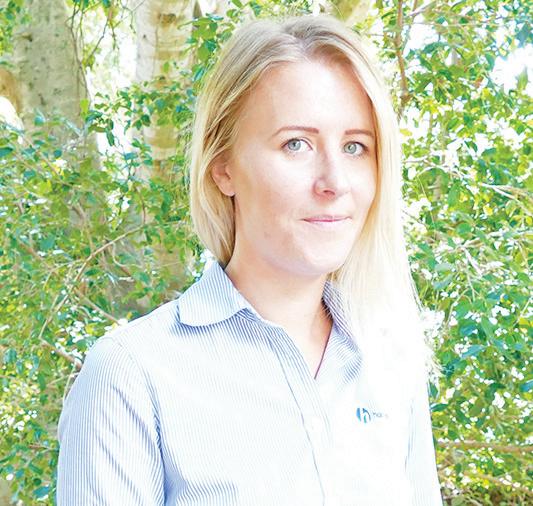
By Lel Parnis, Principal, Holmans
It's common for business owners to spend more time working in their business rather than on their business, but does that approach yield the best results?
Engaging the services of specialist advisers and subscribing to industry associations such as ARAMA can provide access to recognised industry benchmarking data.
By comparing the performance of your business against these benchmarks, you can determine if:
• Your tariffs/rents are competitive.
• Your gross profit margin on your cleaning service is appropriate.
• Your gross profit margin on your linen service is appropriate.























• Your gross profit margin on your credit card facilities is appropriate.
• Your caretaking remuneration is fair reward for your effort.
• Your fee for your management service is sufficient.
• Your occupancy rates are within an acceptable range.
Implementing recognised industry benchmarks as key performance indicators (KPIs) for your business allows you to understand what other businesses are doing, enabling you to identify and adopt "best practices" in your industry.
Like businesses in every other industry, some management rights businesses will continue to outperform others in the same market. The reason for this is that some business owners adopt superior methodologies. Using industry benchmarks, business owners can identify areas for improvement in their own business and implement strategies to rectify performance in those areas.
Benchmarking is a valuable business tool aimed at highlighting the relative performance of your business in terms of income, expense, productivity, and efficiency. The end result should provide you with a list of opportunities to make your business more competitive and ultimately more profitable.
It is essential to highlight the importance of having a clear vision and developing a roadmap for your business. This includes understanding your role within the business and how it may evolve over time.
When starting out, you may do everything yourself: establishing supplier relationships, fulfilling caretaking and maintenance duties, managing owner expectations, taking and fulfilling guest and tenant requests, answering phone calls, dealing with guest and tenant complaints, and much more.
How much you continue to be directly involved in these tasks depends heavily on your vision for your business and how much this requires you to work on the business rather than in it.
There is a bridge every entrepreneur must cross to grow a business beyond a certain point — a point where they must transition from "doing" to "managing." This may mean stepping back from day-to-day operations and assuming the role of overseer. It also involves learning to delegate more significant responsibilities to your employees. Delegation is an ongoing journey. Half the challenge is finding the right people to help you and accepting that doing everything yourself isn't necessarily the best way to get things done. The other half is creating and maintaining efficient, reliable systems and processes.
Once you put the right people, policies, and processes in place, your business should practically run itself. At this point, you can safely disengage long enough to provide the vision essential to the longterm growth of your business.
Work smarter, not harder — outsourcing tasks to the right staff or service providers can be a shrewd investment in growing revenue and improving profits. Good business operators know when to get out of their own way.


By Andrew Morgan, Motel Broker/Partner, Qld Tourism & Hospitality Brokers
I feel like I say this every year at about this time: how quickly the year has gone! The second half of 2024 seemed to disappear before I knew it. Time flies when you’re having fun!
What a busy year it has been. Motels have been, as they say, “the flavour of the month.”
Having said that, caravan parks have also had their fair share of admirers. In summary, goodquality businesses have been in very high demand and selling fast. Those with an issue or two have been slower to move, which is always the case no matter how strong the market is. Buyers have come from all walks of life, from those looking at small leases to “buy oneself a job” and be their own boss, to large corporate entities seeking additional regions and market share.
The motel market has continued its usual trend of aligning itself with the state of the motel industry in general. High occupancies and demand for accommodation have driven a strong number of sale transactions. The only real limitation has been the lack of supply, which again aligns with the industry and comes with the territory of strong trading performances. When business is good, selling is often not high on the agenda. However, as I continue to preach year in and year out, this is often the best time to sell.
2024 saw certain regions outperform others for different reasons. The resources sector remained very active. Companies continued to grow, driving demand for workers, which in turn increased demand and room rates. Government spending also helped drive demand in many areas and industries, leading to increased accommodation needs across the board. Many regional towns benefited greatly from this activity.
Strong enquiry levels kicked off the new year, with investors eager to find opportunities. At this stage, the level of motels available for sale was reasonable without being good. The balance of potential buyers and available opportunities in the market was shifting. As sales occurred, listings were not being replaced.
Motels and caravan parks were clearly being more tightly held.
The second quarter of the year continued to see strong demand from investors. Listings diminished as sales progressed, with genuine sellers reluctant to list their businesses. Transactions involving finance conditions continued to face unnecessary delays. As they say, cash is king, and investors not requiring finance to complete transactions have remained well ahead of the pack in securing and settling contracts. In strong markets, the phenomenon of “back-up buyers” has persisted, where a second buyer is ready to step in if the current buyer cannot complete the contract. This has reflected the ongoing imbalance between willing buyers and limited sellers.
Demand for leaseholds continued to improve, reaching a point mid-year where leasehold demand was rapidly catching up to freehold demand. Since late 2019, freehold tenure had seen the lion’s share of enquiry. With passive investments being as scarce as hen’s teeth, freehold going concern opportunities were being snapped up by unsatisfied passive investors who changed their scope. They created their own passive investments by either selling the lease or installing management. Third-quarter activity remained consistent with earlier trends.
The migration of motel, park, and resort investors to Queensland from southern states continued. Any business in this sector that had been on the market for an extended period had not sold for a reason. In many cases, addressing issues identified by the market enabled some businesses to eventually sell.
The final quarter of 2024 saw a continuation of these trends, with pent-up demand resulting from many buyers being unable to find suitable assets to purchase. Demand remains unmet, and investors are still seeking other accommodation opportunities.
Looking ahead to 2025, how will this dynamic market play out? Will we see a continuation of the trends from the last three years, or a shift? At this stage, strong demand and the trading performances of accommodation businesses across the industry appear set to continue.
Existing accommodation business owners will seek new opportunities, while those wanting to enter the sector will keep knocking on the door.
Queensland Tourism and Hospitality Brokers (QTHB) appreciate the accommodation industry’s support throughout the year. To everyone in the accommodation sector, we wish you a healthy and prosperous 2025.








By Roland Franz, General Manager, Body Corporate Headquarters Strata Consulting Services (Qld)
In this article we explore the key roles in your strata community.
Specifically, the role of the committee and the executive positions of chairperson, secretary, and treasurer, and how the building manager, and body corporate (strata) manager support the committee and provide services that ensure the successful operation of a body corporate (strata) scheme.
Knowing who’s who in the strata zoo, enables owners and residents to contact the right person to assist them when needed, resulting in an enhanced strata experience for all owners and residents.
The Body Corporate and Community Management Act 1997 (BCCM Act) outlines the responsibilities and functions of the body corporate. Central to the effective operation of a body corporate is its committee, which is elected annually to manage the day-to-day affairs of the strata community.
The committee is responsible for the administrative and operational functions of the body corporate. It acts on behalf of all
Knowing who’s who in the strata zoo, enables owners and residents to contact the right person to assist them
owners to ensure the smooth running of the community. The committee's duties include:
• managing finances
• maintaining common property
• enforcing by-laws
• decision-making
The committee must have at least three members, and for schemes with seven or more lots, the maximum number of committee members is seven.
Typically, the committee includes three executive positions: chairperson, secretary, and treasurer. In some cases, a person may hold more than one executive position.
The chairperson plays a crucial role in the committee, primarily responsible for leading meetings and ensuring that they are conducted in an orderly manner. The chairperson's duties include:
• chairing meetings
• ruling on motions
• declaring results
Despite these responsibilities, the chairperson does not have more authority than other
committee members. Their role is to facilitate meetings and ensure that decisions are made in accordance with the BCCM Act and the community's by-laws.
The secretary's role is primarily administrative, ensuring that all necessary documentation and communication are handled efficiently. The secretary's duties include:
• sending notices
• managing ballots
• record keeping
The secretary's role is vital for maintaining clear and effective communication within the body corporate and ensuring that all procedural requirements are met.
The treasurer is responsible for managing the financial affairs of the body corporate. While the BCCM Act does not specify extensive duties for the treasurer, their role typically includes:
• financial reporting
• budgeting and levies
• financial oversight
The treasurer's role is crucial
for maintaining the financial health of the body corporate and ensuring that funds are used appropriately.
In addition to the committee members, many bodies corporate engage a building manager (also known as a caretaker or facilities manager) to handle the maintenance and management of common property. The building manager's duties include:
• facilitating maintenance
• contract management
• emergency response
• reporting
The building manager plays an impactful role in the dayto-day operation of the body corporate, ensuring that the property is well-maintained, and that residents' needs are met. Their proactive and collaborative approach with the committee and body corporate manager is essential for the successful operation of the strata community. By working together, they can address maintenance issues promptly, manage budgets effectively, and ensure compliance with by-laws and regulations.
A body corporate (strata) manager is often engaged to provide administrative services to the body corporate. Their role can vary depending on whether the body corporate has a committee or not. The duties of a body corporate manager include:
• Administrative support: Assisting the committee with administrative tasks such as preparing and distributing meeting notices, managing

correspondence, and maintaining records.
• Financial management: Handling financial tasks such as preparing budgets, issuing levy notices, paying invoices, and managing the body corporate's funds. They may also prepare financial reports and reconciliation statements.
• Compliance and governance: Ensuring that the body corporate complies with relevant legislation and by-laws. This includes advising the committee on legal and regulatory matters.
• Meeting facilitation: Organising and facilitating committee and general meetings, including preparing agendas, taking minutes, and managing voting processes.
• Communication: Acting as a point of contact between the committee and owners, as well as between the body corporate and external service providers.
The body corporate (strata) manager and the building manager are non-voting members of the committee, and work closely with the committee to ensure the effective management of the body corporate.
Managing a body corporate can be challenging, particularly in larger schemes with complex facilities and diverse owner interests. Some common challenges include:
• Conflict resolution: Disputes between owners or between owners and the committee can arise. Effective communication and a clear understanding
of roles can help resolve conflicts.
• Financial management: Ensuring that the body corporate's finances are managed prudently and transparently is essential. Regular financial reporting and budgeting can help prevent financial issues.
• Maintenance and repairs: Keeping common property in good condition requires ongoing attention and resources. Engaging a competent building manager and managing contracts effectively are key to maintaining the property.
• Compliance: Navigating the legal requirements of the BCCM Act and other relevant legislation can be complex. Committees must ensure that they comply with all legal obligations to avoid penalties and disputes.
• Engagement and participation: Apathy is rife in bodies corporate. Encouraging owner participation in meetings and decision-making processes can be difficult. Committees need to find ways to engage owners and ensure participation in significant decisions that affect the entire strata community.
The body corporate manager will use their best endeavours to promote productive collaboration in the best interests of all owners. If the body corporate manager is not effectively serving the body corporate, supporting the committee, or building manager, the committee or owners can take steps to change the manager:
Changing the body corporate manager can help address issues such as poor communication, lack of
transparency, and inadequate financial management.
In the dynamic environment of a strata community, the role of a building manager is indispensable. The presence of a building manager brings numerous benefits to residents and owners, enhancing their living experience and safeguarding their investment.
• efficient maintenance and repairs
• professional management of service providers
• emergency response
• enhanced communication
• regular reporting
Without a building manager, strata communities can face several challenges:
• delayed maintenance and repairs
• inefficient management of service providers
• poor emergency response
• communication breakdowns
Effective collaboration between committee members, the building manager and strata manager, is a fundamental requirement to ensure the successful operation of a strata community.
Here are some practical tips to enhance this collaboration:
1. clear communication channels
2. defined roles and responsibilities
3. regular updates and reporting
4. social interaction
5. mediation and dispute resolution
The benefits of effective collaboration between the key roles working together harmoniously are manifold.
• Streamlined operations: Clear delineation of responsibilities and regular communication ensure that all aspects of property management are covered efficiently.
• Proactive problemsolving: Collaborative efforts enable the early identification and resolution of issues, preventing them from escalating.
• Enhanced community engagement: Regular updates and transparent communication foster a sense of trust and community among residents.
• Improved financial management: Coordinated efforts in budgeting and financial oversight ensure that funds are used effectively, maintaining the property’s value, and reducing unnecessary expenses.
A pro-active and functioning committee, supported by an effective body corporate (strata) manager will take care of the paperwork, financial and compliance side of the equation.
A proactive and dedicated building manger should not be taken for granted or undervalued. Working collaboratively with the committee and strata manager, the building manager enhances the living experience for all residents and owners, making the strata community a well-managed and harmonious place to live.
To enhance your strata experience I encourage you to value your building manager and body corporate (strata) manager and the services they provide. And remember, the committee are elected volunteers and members of your community and without their contribution your strata experience may not be as you envisage.
If you want to make a positive difference, consider nominating for the committee and be a part of the solution you seek to enhance your strata experience.
Suggested topics for future comment are welcome contact via editor@resortnews.com.au
It’s that time of the year again:

















By Lynda Kypriadakis, The Diverse Group of Companies & DPX Projects
As storm season approaches, building managers for residential and mixed-use strata properties in Australia must prioritise the safety and wellbeing of their residents.
With the unique challenges posed by severe weather events, ranging from intense storms and flooding to high winds, it's essential to develop a comprehensive preparation strategy. This article outlines critical steps for building management teams and their strata committees to effectively prepare for the storm season.
Australia's diverse climate means that different regions face various storm-related risks. Coastal areas may experience cyclones and heavy rainfall, while inland regions may contend with flash flooding and severe storms. Familiarising yourself with the specific threats in your area is crucial, including the local flood zone report held by your local council. Historical weather
patterns, council flood plans, and local meteorological data can provide valuable insights, helping managers tailor their preparation plans to the unique challenges of their community.
An effective emergency preparedness plan is vital for strata communities. This document should outline actions the management team will take before, during, and after a storm. A flood and storm management plan is the solution and an ideal document to start preparing at this time of the year (or refresh from last year).
Key components to include in your flood and storm management plan are:
• Risk assessment: Identify potential hazards, such as flooding zones or trees that could pose a risk to the building. Understand the vulnerable infrastructure below ground level (for example, electrical or ventilation infrastructure) that may be adversely affected by a flood or storm event.
• Resource allocation: Ensure that essential supplies (walkie-talkies, radios for updates, sandbags, batteries, first-aid kits, submersible pumps, clean up assistance, and so on) are stocked and accessible.
• Roles and responsibilities: Assign specific tasks to building management, maintenance staff, and the committee, focusing on communication, logistics, and safety monitoring. Recruiting a volunteer workforce ahead of a storm event is also a good idea. Try to allocate tasks and responsibilities to capable volunteers before the storm hits. For example, who is responsible for watching the storm alerts and communicating details to everyone?
Regular reviews and updates of the flood and storm management plan will ensure it remains relevant and effective, especially pre-storm season.
Clear communication is essential for ensuring residents are informed and prepared. Building managers should proactively engage residents through various channels, such as:
• Resident and committee meetings: Organise prestorm season meetings to discuss the flood and storm management plan and answer any questions. Ensure key roles and responsibilities are explained. Follow up and support volunteers to understand their role.
• Digital updates: Utilise emails, SMS alerts, or community apps to provide timely information and updates. Understand which occupants are unlikely to receive digital updates and ensure there is some communication alternative. Remember that power is likely to be interrupted during a severe storm or flood.
• Physical notices: Post updates in common areas to reach all residents, ensuring that everyone is kept in the loop. Don’t forget the high-risk occupants with evacuation vulnerabilities. They may need face-to-face communication, or hard copy notices placed under their doors.
It's essential to develop a comprehensive preparation strategy
Establishing a reliable communication framework will help residents feel more secure and informed and remind them of the invaluable role the building manager plays in a strata or community titles scheme.
Before storm season begins, a thorough inspection of the building is crucial. Address any vulnerabilities, focusing on:
• Drains: Ensure the routine inspection, servicing and clearing of the drains has been done prior to storm season.
• Pumps: Don’t forget to have the pumps serviced as well. If routine basement flooding is common at your property, consider early hiring of the extra pump equipment so it is on site and ready to go.
• Roof and gutters: Ensure the rainwater disposal system on the roofs are sound and gutters are cleared of debris to prevent water accumulation. An annual inspection of the roof and gutters will not only deal with any defects as they arise, but also provide an audit trail of vigilance for the body corporate insurer, so “money well spent”.
• Windows and doors: Check seals and install storm shutters where applicable. Deal with window leaks as soon as they become apparent.
• Common areas: Secure outdoor furniture, signage, and any items that could become hazards in high winds. Ensure basement carparks are evacuated in good timing.
Creating a checklist for routine maintenance tasks required ahead of the storm season should be a key document
within your flood and storm management plan as it will help ensure nothing is overlooked.
In the event of a severe storm, clear evacuation procedures are essential. An emergency evacuation plan is a mandatory requirement under fire legislation (Class 2-9 buildings) and workplace health and safety legislation (for the person conducting the business or undertaking), so ensure your emergency evacuation plan is reviewed annually and up to date.
• Designated safe areas: Identify safe zones and assembly points within the building for shelter if evacuation is necessary.
• Evacuation routes: Ensure that exit routes within the building are accessible for all residents, including those with disabilities. It is an offence under the fire legislation to have anything blocking the fire escape routes, so ensure stairwells and exit points are clear at all times. Also consider the safest evacuation routes from the building, checking which roads are least likely to be blocked or flooded once everyone starts evacuating.
• Practise drills: Training practises or drills are a mandatory requirement of the emergency evacuation plan, so ensure these are up to date. Training practise drills help to familiarise residents with the evacuation procedures and protocols. The building manager usually volunteers to be the evacuation coordinator, to ensure the mandatory emergency evacuation plan is reviewed annually and circulated to
all occupants. Check who is taking on the evacuation coordinator role.
A well-prepared strata community is more likely to respond effectively in an emergency.
After a storm, assessing damage and communicating with residents is vital. Consider planning to follow these steps:
• Damage assessment: Conduct a thorough inspection of the property and document any damage for insurance purposes. It is recommended that one person is the liaison for insurance claims to keep the records clear and concise.
• Resident communication: Keep residents informed about the status of repairs, including timelines and available resources, such as local emergency services, especially if the building requires evacuation. People need to know when to remove their vehicles from the basement carpark (so as to avoid the flood), and they also need to know when it is safe to return. If power is being disconnected, clear communication on this side also needs to be managed.
• Support resources: Provide information on community resources for residents needing assistance, especially those impacted significantly by the storm. Local councils usually have comprehensive support resources for emergency event management.
Preparation for storm season is a critical responsibility for building managers and committees. By developing a comprehensive flood and storm management plan, ensuring clear communication, and proactively addressing building vulnerabilities, building managers and committees can significantly enhance the safety and resilience of their communities. Encourage your building management team to take proactive measures today to face storm season with confidence and care for the well-being of all residents.

Today, against the advice of the managing director, I am going to have a bit of a rant and stray into politics. The MD, while used to my strident oratory on all manner of topics, thinks I should steer clear of race, religion and politics — in that order. As a white Anglo-Saxon Catholic conservative, she would say that, but as always, I digress.
The triumph of Trump on November 5 must surely give pause to politicians of all persuasions here in Oz. As a human being, we might agree that Donald Trump is a misogynistic, grubby, malignant narcissist, but man, has he hit a nerve or what! The Trump campaign, in all its shambolic magnificence, essentially riffed off an old Ronald Reagan mantra: Get off my back, get out of my pocket and let me have more control of my own destiny. The Trump campaign was quoted on multiple occasions promising to get out of people’s pocketbooks. Understanding that the term "pocketbook" roughly translates to one’s personal budget, you get the picture.
Of course, what Trump says and what he means can take some interpretation. A good example is his “Drill, Baby, Drill” slogan, first popularised by Governor Sarah Palin during her own presidential bid. It’s best not to take these slogans literally but to appreciate the core message which, in this case, is cheap power and energy dependency.
His promise to deport millions on Day 1 of his reign is another example of hyperbole used to cement a message. No doubt the Trump administration will work to stem illegal immigration and get rid of undesirable aliens, but it won’t happen on Day 1.
Here’s the thing. If we look at the big-picture issues that drove the presidential campaign in the States and make the reasonable leap that the average American might not be so dissimilar to the average Aussie, then there are lessons to be learnt. In the Land of Oz, we have a federal government that wants to tax the hell out of those “lucky” enough to have worked hard and done well.
Immigration is out of control, renewables policy is an insane and costly debacle, the NDIS a playground for rent seekers and exploiters of the scheme, nuclear energy banned, criminals running riot and — best of all — pending legislation that, if passed, will give bureaucrats the power to tell us what to say.
All of this is bad news if you care about freedom of expression and aspirational advancement. But I have very good news. Courtesy of the Trump win, we now have some sort of barometer of what the average punter thinks is important. I’m not remotely shocked to conclude that all the side issues, confected rage and identity politics at play here matter not one iota to most of us. More importantly, surely, is the ability to access reliable and
affordable power, see our kids enjoy a decent education — not indoctrination — work hard and do well, and not be treated like an idiot or, worse, a cash cow.
If, like me, you’ve worked hard your whole life and managed to enter your twilight years with a few bob in reserve, here’s what our current federal and state governments have in store for you. Make no mistake, negative gearing and associated tax benefits aligned to property investment are in the crosshairs. When combined with onerous landlord obligations and increasing tenant rights, I foresee property investment becoming less and less attractive. Should lead to great outcomes for tenants... not. The cost of energy combined with insane levels of employee compliance obligations and red tape will continue to send small businesses broke. Why would anyone bother to risk all to create employment opportunities only to be flogged to death by a bureaucracy that’s never run a successful business and wouldn’t know where to start? And that’s before you meet your DEI obligations, which are clearly designed to ensure the last person to get hired is the most qualified. Talk about walking as slow as our slowest citizen!
But all this pales into insignificance next to the most breathtaking plan currently being debated at federal level. It’s a complicated matter misleadingly called the Better Targeted Superannuation Concessions Bill, albeit the basics are simple. It’s targeted, all right — straight at those who’ve worked hard and got lucky. If you’ve got more than $3 million in your super, you may be taxed on what is referred to as unrealised profits. That is, on capital growth within the fund once total asset values exceed $3 million. To be clear,
the proposed tax would apply to balances in excess of $3 million, not the entire balance of the fund. This is a tax on money you haven’t earned and maybe don’t have liquid. If you get a tax bill, it could be that you need to sell assets set aside to fund your retirement just to meet the tax. Then, when you retire, you can escape means testing because you’ve got no dough and access a pension funded — yes, you guessed it — by the taxes you’ve paid. It’s brilliant! Oh, and the $3 million is not indexed, so the real value of the cut-off point will erode over time, and more and more people will be caught.
Kamala Harris supported a similar tax scheme in 2022, albeit with much higher benchmarks and not confined to retirement benefits, and we know how she went. The point is not the $3 million, of which only about 55,000 Australians will be caught (not me, by the way!). It’s the lack of indexation combined with a tax on money you don’t have that scares me. What next — stamp duty on a house you might buy one day, PAYG payable now on next year’s salary? It’s a slippery slope, and all taxpayers should be rightly outraged!
The bottom line is fairly simple, I suspect. We are fast becoming a reliance economy where the many rely on the few to fund ever-increasing levels of government dependency, social services and downright rorts. The very rude and squeaky wheels get the oil, and the aspirational workers have had enough. For a bloke as flawed as Donald John Trump to triumph, things need to be pretty bad — and they are.
Let’s hope Peter Dutton is listening.

By Kelley Rigby, Managing Director, Lett s Group
Before I dive into my last article for Resort News for 2024 — can you believe it? I certainly can’t! — I want to take a moment to express my heartfelt gratitude to Resort News and the magnificent, passionate, kind, and supportive Mandy and Patrick Clarke for once again giving me the opportunity to contribute to this incredible industry magazine.
To all the readers who continue to engage with my content, reach out with their thoughts, or tap me on the shoulder at events to share how they’ve implemented something I’ve written — thank you. Your support truly makes my day. From a girl who once struggled with English to have now written 48 published articles (and counting), I’m endlessly grateful for this journey. Thank you for being part of it.
Now to the December article, one that hit close to home for me…
As a parent of three energetic children — Ryder (5), Harley (3), and my newest addition, Ranger (9 months) — I have come to understand the immense weight of responsibility that comes with raising kids. In my journey as a mother, I have made a profound realisation that could

equally apply to managing a management rights business: it truly does take a village. Just like raising children, the world of management rights can be challenging and overwhelming, filled with unforeseen obstacles. However, through community, support, and shared experiences, we can navigate the complexities together.
Management rights can be draining — mentally, emotionally, and physically. The industry is filled with high-stakes decisions and unexpected surprises, much like the unpredictability of parenthood. You might think you have everything sorted out, only to have the rug pulled out from under you in an instant. This is where the wisdom of community becomes invaluable.
Let me share a story about Brad and Jill, new managers entering our management rights industry. They prepared diligently, fretting over every detail leading up to settling into their short-term building. However, during their first week, they encountered issues that simply left them unprepared: missing bookings in the system, a change of management email, and a host of other curveballs. Thankfully, Jill had the foresight to cultivate a network before taking on their business.
Remembering the connections she had formed, Jill turned to the stack of business cards she had collected. It was filled with invaluable contacts — fellow managers, legal advisers, and software consultants. In that moment of panic, she realised that rather than facing those hurdles alone, she was surrounded by a supportive village ready to offer guidance and assistance.
Communities in the management rights sector are incredibly diverse and rich with knowledge. Whether through forums, local meet-ups, or industry events, opportunities abound to foster relationships and exchange insights. These interactions do more than just provide valuable information; they build a network of camaraderie that can be crucial during tough times.
So, what’s the takeaway here? As you navigate the often turbulent waters of management rights, it’s vital to remember that while the responsibilities can feel overwhelming, you do not need to shoulder them alone. Seek out your village — attend events, engage with peers, and share your insights and experiences. Like I’ve learned amid the chaos of raising my children, it’s absolutely okay to
ask for help and tap into the wisdom of those around us.
Moreover, let’s not forget that community isn’t just about receiving help; it’s also about giving back. Sharing your experiences — both successes and failures — can empower others who might be going through their own struggles. Just as I’ve gained invaluable advice from other parents during late-night calls or casual chats at daycare drop-offs, each one of us can inspire and uplift those around us.
In this intricate landscape of management rights, let’s create an environment where collaboration and support are at the forefront. It is through the collective strength of our village that we all can succeed. So, step out of your comfort zone, engage with your community, and remember we’re all in this together. Embrace the journey, and let’s thrive as a united village in the world of management rights.
We wish you all a wonderful Christmas and hope you are making some incredible memories with the people you love.
The Rigbys (Scott, Kelley, Reese, Charlie, Lily, Ryder, Harley & Ranger).


By Sam Steel, Co-Founder, Resly
As the holiday season fast approaches, the hospitality industry braces for its busiest time of the year.
For property managers, the festive period can be both a boom and a challenge. Ensuring seamless operations during this time requires thorough preparation. Here are some key strategies to help you get ready for the seasonal surge and keep both your guests and staff happy.
1. Check supplier schedules
One of the simplest preparations to make is confirming your suppliers’ holiday schedules. From linen services to food and beverage vendors, it’s crucial to know who will be available and when.
Contact your suppliers early and confirm delivery dates and potential delays to avoid any last-minute surprises. This step will help you stock up on essentials like linen in advance, ensuring that your operation runs smoothly even if your suppliers take a break.
2. Stay ahead on maintenance
Preventive maintenance can save you significant headaches during peak occupancy. Here’s a checklist to consider:
• Pools and spas: Ensure that pools and spas are serviced and in top condition. The last thing you want is a maintenance emergency when guests are eager to use these amenities.

Our team of legal experts, led by Col Myers, has over 40 years’ experience in this area and will get you the best possible outcome. Tel: +61 (0)7 5552 6666 M: +61 (0)417 620 516

• Room inspections: Conduct thorough checks of every room to ensure room amenities are fully stocked. Confirm that all electronic devices, including TVs and wifi routers, are in working order.
• Air conditioning units: Make sure air conditioning units are functioning optimally, especially as the summer heat intensifies. Simple checks and routine servicing can prevent units from failing when they are needed most.
By addressing these elements in advance, you’ll reduce the risk of breakdowns or service disruptions that could dampen the guest experience.
3. Support your staff
The holiday season can be a demanding time for your team. Ensuring staff morale remains high is essential for maintaining a productive and welcoming atmosphere. Here are a few tips:
• Surprise and delight: Small gestures go a long way. Treat your staff to morning coffees, chocolates, or small gifts to show appreciation for their hard work. These thoughtful acts can make all the difference when workloads increase.
• Team gatherings: Organise a pre-holiday team barbecue or morning tea to foster camaraderie and keep spirits up. These informal events help reduce stress and reinforce a sense of community.
• Light at the end of the tunnel: Plan a postholiday event, such as a team lunch or a day out in February, so staff have something to look forward to. This simple incentive can motivate your team to push through the busy period with enthusiasm.
4. Review automations and systems
Technology is your ally when managing peak periods. Review your systems and ensure that all automations are activated and functioning correctly. Platforms like ReslyPay and Good to Book can streamline processes, making transactions smoother for both guests and operators.
Automating payment and booking confirmations can free up valuable time for your front-desk team, allowing them to focus on providing exceptional guest service.
5. Communication is key
Finally, make sure your team is informed and aligned. A wellbriefed team is better equipped to handle challenges and maintain high service standards. Daily check-ins or a shared digital dashboard can help keep everyone on the same page.
By following these preparation tips, you can reduce stress, improve guest satisfaction, and create a supportive environment for your team. The holiday season may be demanding, but with a proactive approach, it can also be a rewarding and memorable time for everyone involved.
















By Chris de Closey, Director, Switch Hotel Solutions
Our reception and reservations teams play a vital role in ensuring our guests have an amazing experience from the moment they book their reservation with our property.
One of the key ways they can do this is through upselling, which not only provides a benefi t to the customer but also off ers a significant benefi t to the business.
Upselling involves off ering guests additional services, upgrades, or amenities that enhance their experience while boosting the hotel's revenue. If you’re unsure where to start, this guide will help you understand its importance, benefi ts, and tips for eff ectively implementing an upsell strategy.
Upselling is not just about increasing guest spending; it’s
about enhancing the guest experience by off ering tailored options that can make their stay more enjoyable. For the hotel, upselling increases revenue. For guests, it provides an opportunity to elevate their stay — whether through a room upgrade, additional amenities, or special services.
1. Enhanced guest satisfaction
Upselling can significantly improve guest satisfaction by off ering personalised options that suit their wants or needs. For instance, a guest celebrating an anniversary might appreciate the suggestion of a room with a superior view or a romance package that includes spa services, roses, chocolates, and a bott le of champagne.
2. Increased hotel revenue Eff ective upselling strategies directly contribute to the bottom line. By off ering room upgrades, extended stays, or additional services like dining and spa treatments, hotels can significantly increase their average daily rate (ADR) and overall profi tability.
1. Understanding guest needs
The key to eff ective upselling is understanding what the guest values. This starts with good communication. Asking openended questions about the purpose of their visit or their
preferences can provide insights into what additional services might enhance their stay. Ensure you understand their needs so you can off er the right upsell. For example, if a guest mentions they have an early flight, you wouldn’t try to sell them a late checkout!
2. Timing is everything
The best time to upsell is when guests are in a positive mood, such as during a smooth check-in process or when they enquire about services over the phone. It’s important to approach the upsell naturally and avoid making the guest feel pressured.
3. Highlighting the benefi ts
When suggesting an upgrade or additional service, highlight how it will specifically benefi t the guest’s stay. For example, a room upgrade might off er a better view, more space, or premium amenities that could make their experience more comfortable and memorable.
4. Training and incentives
Regular training sessions can prepare the reception team to handle various upselling opportunities and challenges. These sessions can help staff practise introducing off ers in a confident, friendly, and persuasive manner. Additionally, motivating the team with incentives for successful upsells can encourage engagement. Incentives don’t always need to be monetary; recognition and rewards can also be eff ective. Make it a game with the team and create some friendly competition!
Digital tools and soft ware can provide the team with real-time information about available upgrades and additional services. These tools can also help track guest preferences and history, which can be invaluable in tailoring upselling opportunities. Automated messages can also be used to off er basic upsells, such as room upgrades or late checkouts, that are always available.
This is where you can get creative! Hotels with food and beverage facilities can easily upsell packages, but those without can still off er plenty of options. These might include room upgrades, late checkouts, extended stays, early check-ins, tours, services at local spas, transfers, dining packages, shows, and more.
Upselling is an art that, when executed well, benefi ts everyone involved. For guests, it enhances the overall experience by off ering additional services tailored to their needs. For hotels, it not only boosts revenue but also improves customer satisfaction, leading to repeat visits and positive reviews. For the reception team, it increases job satisfaction and develops their skills. By focusing on training, incentives, and the right tools, properties can master the art of upselling, turning every guest interaction into an opportunity to create an outstanding stay.


By Mike O’Farrell,
In management rights, success is built on a foundation of principles that foster harmony and value in our schemes. I have distilled these principles into ‘The 10 Commandments’ that every high-quality building manager should follow.
1. Promote the triangle of management
Our schemes comprise three key stakeholders: the body corporate, the committee, and us, the building manager. I refer to these as the triangle of management, or ‘triangle of peace’. When one of these parties becomes out of sync, it can create challenges for the others. Sometimes, providing a bit of extra service so everyone feels heard goes a long way and ensures long-term satisfaction.
2. Develop a BEST 4 BUILDING (B4B) attitude and know your building
Each scheme is ultimately governed by its by-laws and service agreements. Building managers may be pressured by committees to take on duties beyond their agreements. Knowing the building’s regulations and contracts ensures you can protect your workload and maintain compliance. Familiarise yourself with your CTS number and option renewal dates.
3. Present yourself professionally
Professionalism is key. Arrive on time, dress appropriately, and

speak clearly. Simple things, like wearing a uniform with logos or a name tag, build trust, instil confidence, and show pride in your work. Your building’s community will take notice!
4. Follow the caretaking agreement
The caretaking agreement outlines your responsibilities and obligations. Know this document well so that you understand which duties fall within your remit. Taking on tasks outside this agreement can impact your insurance coverage, while neglecting responsibilities can lead to breaches or RAN notices. Consider developing a performance management plan aligned with your duties — if it’s not written down, it didn’t happen.
5. Be proactive
As the expert, the responsibility stops with you. While reactive management — fixing things as they break — is common, proactive management saves time and stress. By staying ahead of maintenance and offering solutions with detailed reports,
quotes, and cost projections, you build credibility. This effort will pay off when it’s time to negotiate a top-up or higher remuneration.
6. Avoid secret commissions
Integrity matters. Once trust with your committee and owners is broken, it’s difficult to rebuild. Avoid under-the-table deals, undisclosed payments, or secret commissions. My motto is “honesty always works.” Act as if someone is always watching — these days, they likely are.
7. Communicate regularly
A building manager must keep the committee and owners informed about the building’s condition — the good, the bad, and everything in between. Regular, professional updates foster trust, respect, and community spirit. Remember, digital communications are often saved and referenced later, so ensure they’re positive, informative, and professional.
8. Take breaks
We’ve all seen the effects of burnout: people get frustrated, take shortcuts, and may become
rude. Taking time out to recharge is essential. Organise a backup or delegate tasks to maintain operations in your absence. A break can refresh your enthusiasm, spark ideas, and help you discover new solutions.
9. Join industry bodies
Management rights work can be demanding and isolating, particularly during disputes. Industry bodies offer valuable resources and support. I encourage all building managers to be involved. You’ll gain access to legislative updates, industry news, and a reliable support network. Our industry body, ARAMA, offers tremendous value for its members — I’m one of them!
10. Remember: Success is always a work in progress
The journey is constantly evolving with changes in circumstances, industry, and the world. We’re all navigating the road to success together. Stay committed, keep making decisions thoughtfully, and you’ll prevail.

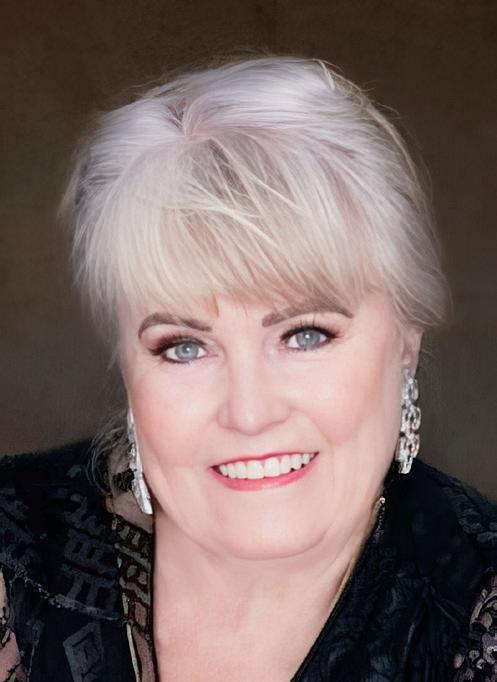
Following on from last month's article about acting like chickens, I had to share my story about taking the bull by the horns and not being a chicken!
Long before reading Stuart McMullan’s stop acting like
chickens post, my husband and I decided that we were tired of hearing about others in the industry receiving better interest rates on their loans. We work tirelessly to pay off our loan, work with our banker, and work hard to build a great credit rating. Based on this, we had approached our bank a couple of times to request an interest rate review and were constantly knocked back by other terms to our loans that the bank wanted to change, “in return” for offering us a slightly lower interest rate. These changes were not suitable or in the best interest of the business, so we kept rejecting them.
The final straw for us was when good friends of ours bought a new accommodation business and were offered a stunning interest rate. We decided it was time to act or make a move to a new bank. Rating loyalty highly, this was not an easy decision, and one that we knew would bring all sorts of work and change, but one that just might be necessary.
Armed with market information, we made an appointment to meet our bank business manager. We presented him with the information and what we would find acceptable. Explanations and advice on how the bank works followed and what the bank uses to make decisions, all relevant to the bank, but not to our business. We refused to back down on what was important for us and our business, why we believed we should be rewarded with better rates, and what we needed from our bank.
Mark Ryall our finance broker backed us up constantly, providing us with updated information and incredible support, as did our accountants. The time and effort invested in pursuing a better deal, paid off handsomely, when to our absolute delight, our bank advised us that they would be happy to meet other offers we had received as they would not like to lose us as clients. Moreso, they developed an
innovative and flexible loan for us, one that ticked every box we had presented them with.
To many, this would be a pointless battle, one not worth the time, effort and energy. To us, it is a victory to not stand back and be dictated to by big business, a victory for “not being chicken” and for being loyal to our business and success.
So, the motto for this article is stand up for what you believe in. Don’t be chicken; do what is good for you and your business.
Some feedback about Christmas décor: Three management rights owners have advised that in their building the body corporate supplies décor, and pays a contractor to install and remove the décor, while two others have advised that the body corporate supplies and pays the onsite staff to install and remove the décor.
What happens in your building? E-mail me: marion@ boulevardnorth.com.au













The launch of ResortBrokers Research’s third annual report attracted the who’s who of Australia’s management rights industry!
The official launch of ResortBrokers Research’s Management Rights Report 2024 took place at Howard Smith Wharves, Brisbane, on November 14 and saw a packed room of more than 120 management rights industry professionals.
Now in its third edition, the Management Rights Report has established itself as the definitive benchmark study of the industry and remains the only quantitative analysis of its kind. The 2024 report was covered in the print edition of the Australian Financial Review on the Monday following the launch.
The report was presented by authors Property Economist Josh Mangleson, head of ResortBrokers Research, and Directors Alex Cook and Tim Crooks, to an audience of management rights stakeholders comprising lawyers, developers, accountants, valuers, brokers and operators. The event was sponsored by internet service provider Gigafy and body corporate management services provider Stratacare Australia.



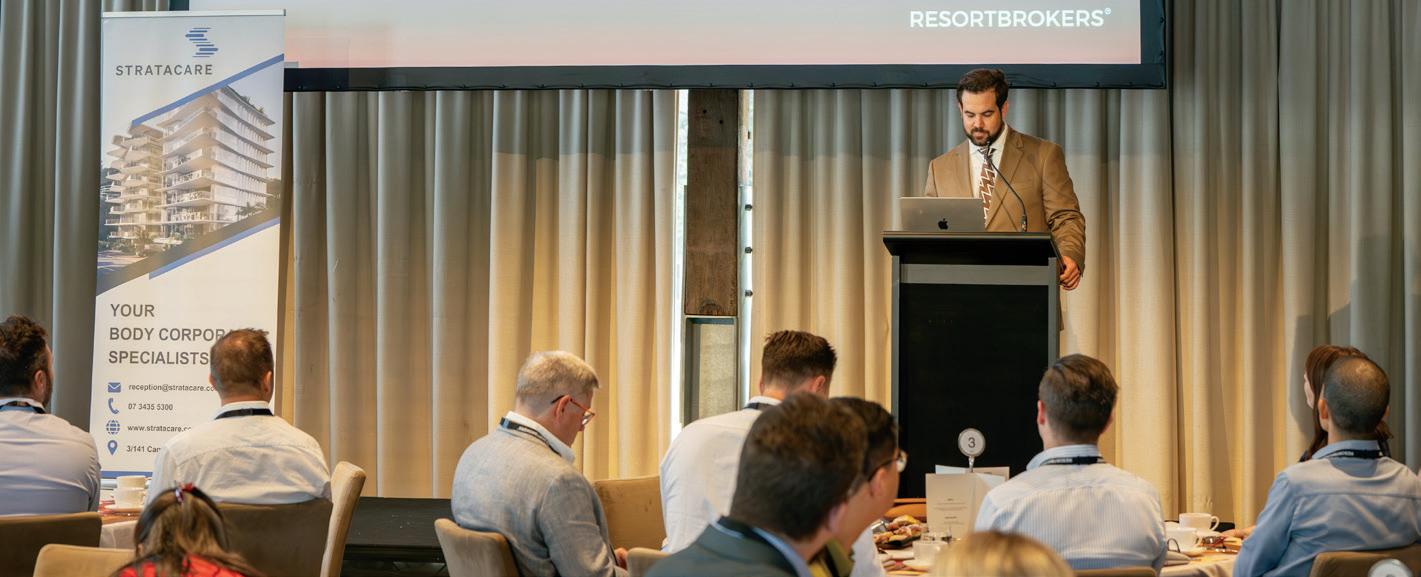

Photography: Renee Andrews Photography
For the final event of 2024, attendees indulged in a “splendide” French-themed luncheon at the stunning Overflow Estate in Beaudesert.
The afternoon began with welcome drinks and canapés on the lawn, followed by a delicious three-course meal, setting the perfect stage for networking and connection.
A heartfelt thank you to Metered Energy for hosting this memorable lunch, and to all our sponsors and fellow professionals for making 2024 another successful year. Here’s to celebrating our achievements and looking ahead to an even brighter 2025!










Photography by: Candy Vision


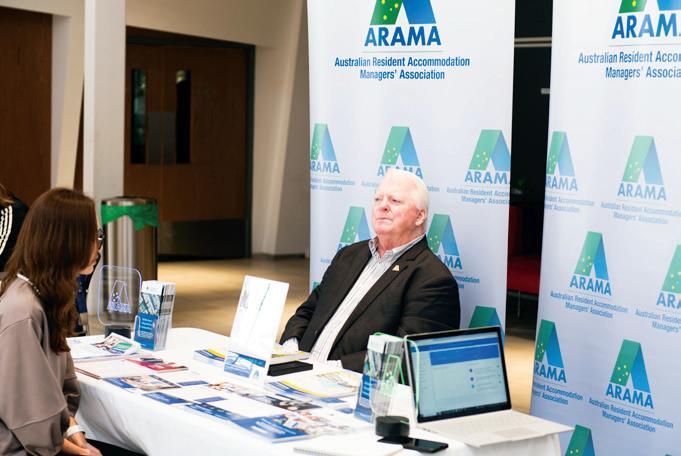





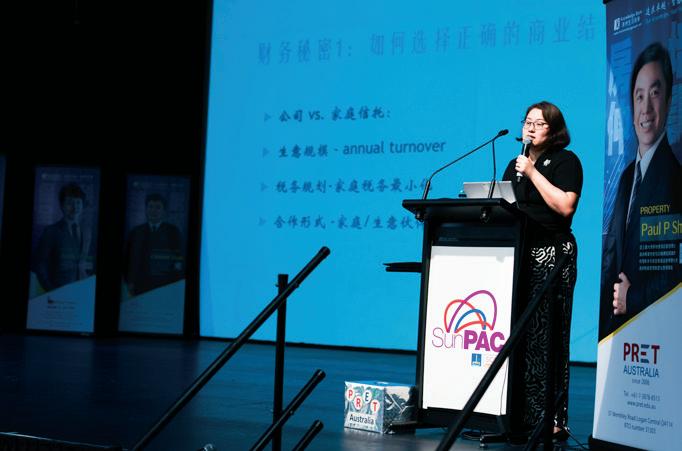

More than 200 professionals from the property management rights sector came together at SunPAC for the 2024 APMA Property Management Rights Summit.
Organised by the Australian Property Management Alliance (APMA) and hosted by the Knowledge Bank Australia, the summit featured expert presentations from six prominent speakers. Attendees praised the high-quality event and expressed their hopes for it to continue annually, to facilitate increased industry exchange and professional growth.
The event was led by Mr Paul Shih, the Honourable Chairman of APMA, co-founder of the Knowledge Bank Australia, SunPAC board director, and chief trainer at PRET Australia. Many attendees, including some who had studied with Mr Shih over a decade ago, enjoyed the opportunity to once again experience his engaging and humorous teaching style. Mr Shih highlighted that the summit aimed to share knowledge, and gather feedback from industry professionals regarding current regulations, which will be submitted to the new Queensland Housing Minister. The attendees were enthusiastic about the recent government change, hoping for more support for small businesses.
The summit's first speaker was Mr Trevor Rawnsley, CEO of the Australian Resident Accommodation Managers Association (ARAMA). He provided an update on the new requirements for ongoing training for real estate professionals, set to begin in June next year. Queensland will be the last state to implement

this change. Key industry associations emphasised the importance of continuous skill enhancement for professionals. ARAMA, in partnership with PRET Australia, will launch CPD courses designed to benefit industry members, requiring them to complete two units annually, totalling around six hours of learning.
Mr Rawnsley also shared that with the new government's rise to power, longstanding challenges related to the terms of management rights businesses are expected to be resolved, providing at least four years of stability. ARAMA plans to push for rental law reforms to ensure fairness in the industry. He also introduced an attractive member benefit: legal indemnity insurance coverage of up to half a million dollars. Any legal costs exceeding $50,000 would be supported by this insurance, serving as a strong deterrent to frivolous litigation by owners' committees. During the break, the ARAMA booth experienced a surge of interest, with many attendees eager to sign up.
Following this, Mr Alex Cook, Director of ResortBrokers, and Jessie Shi, a top Chinese sales broker, presented the third edition of the ResortBrokers Property Management Rights Industry Report. Although the official release was scheduled for two days later, summit participants were given a sneak preview and promised a free digital copy upon publication. The report highlighted significant industry growth, now valued at $9.4 billion, with 4259 communities across Australia managing assets worth over $200 billion. Knowledge Bank Australia featured six expert speakers throughout the event. As well as Mr Shih, co-founder and CEL accountant Mr Edward Lin delivered a closing presentation on key tax regulations relevant to the industry. Bugden Allen Legal expert Kevin Pai and Innovision BCS Hsuan Chang shared valuable insights on increasing income and extending contract terms. Golden Water Finance expert Ms Penny Huyan and KP Business Advisors auditor Ms Eva Yang discussed crucial information regarding loans and refinancing in the management rights business.
In an interactive session, Mr Shih invited three leading sales experts in the management rights sector — Ms Bobo Qi of Property Bridge, Ms Celine Tseng of Shine Realty, and Ms Jessie Shi of Resort Brokers — to join him on stage to answer questions from the audience. Their extensive experience in the industry meant they could provide comprehensive responses to various enquiries from attendees. Outside the lecture hall, other experts from Knowledge Bank Australia were available throughout the day for consultations with guests. Sponsored by APMA, attendees enjoyed a delicious Taiwanesestyle lunch provided by Yuan Bao, along with Taiwanese snacks and beverages for morning and afternoon tea, courtesy of TF International, making the event a highly valuable experience.
Mr Shih concluded the summit by announcing a larger forum, exhibition, and charity gala dinner planned for August 23, 2025. Knowledge Bank aims to invite even more industry experts and professionals for this upcoming event. Stay tuned for further updates!

On the afternoon of Thursday, November 28, industry experts, bankers, finance brokers, agents and others (including the odd valuer) gathered at the excellent establishment of Pavilion, Mooloolaba, on the Sunshine Coast.
The directors of Accom Valuers, Alison Sun and Alex McCowan, hosted an exceptional afternoon of food, drinks and lively conversation. All of this took place with the superb and undeniably best view on the Sunshine Coast: Mooloolaba’s beach from the restaurant.
It was a perfect day with bright sunshine, boats, surfers and tourists below. The occasion celebrated the 2024 year and offered a small thank you to the many industry people Accom Valuers relies on to provide the valuation component of the overall transaction process.
Our busy lives and work can sometimes make it difficult to meet those at the other end of the phone or email, but how wonderful it was to finally put a face to the name, as they say.

No MLR gathering is complete without the presence of Mike and Sue O’Farrell and many other stalwarts of the industry, including Mike Phipps and his team. There is an inexhaustible amount of wisdom and knowledge just with these long-time members of the industry.
Alex said: "Since Alison and I commenced our new company, Accom Valuers, in July 2020, we have worked hard to perfect our reporting and processes. Being a small company has some excellent advantages, allowing us to adapt our reporting and seize opportunities much quicker than larger organisations with long chains of command.
"We welcome all feedback — good and bad — and trust that our colleagues in the industry will continue to utilise our skills and market knowledge. At Accom Valuers we recognise that market conditions can quickly change, and we pride ourselves on keeping abreast of the recent sales occurring throughout the wider MLR industry including Brisbane, Sunshine Coast, Gold Coast, regional Queensland, NSW and Victoria markets."


In an exciting step forward for Noosa’s luxury accommodation scene, Noosa Shire Council has approved the long-awaited development of The Calile Noosa.
After a two-year journey of community consultations and meticulous planning, the landmark resort project has received the green light, with construction set to start in early 2025 at the serene 2.4-hectare site on Serenity Close.
The Malouf family, founders of The Calile brand, are thrilled to bring their unique vision of understated luxury to Noosa. “We worked collaboratively with Noosa Council and finetuned the scheme to ensure we addressed the planning scheme and community expectations,” said Michael Malouf, coowner and CMI Director of The Calile.
Emphasising a strong commitment to local culture, Mr Malouf added, “Resort sites are often at risk of being ceded to multinational hotel companies… By contrast, The Calile is a home-grown Southeast Queensland brand with an implicit understanding of the local culture, climate, community, demographic, and attributes.”

The new resort, designed by acclaimed architects Richards & Spence—the team behind the much-celebrated Calile Hotel on James Street, Brisbane—will harmonise seamlessly with its bushland setting. Guests can expect 153 luxurious rooms, 29 suites, and four villas, including threebedroom villas perfect for families or group bookings. With generous room sizes, the resort will boast a stunning 50-metre main pool, a tranquil garden pool, and extensive wellness and function spaces.
The Calile Noosa promises to deliver a resort experience unlike any other.
As with all Calile properties, sustainability is a cornerstone of the project. The Noosa resort aims for carbon-neutral operations, blending The Calile’s renowned design integrity with eco-friendly initiatives to create a sustainable, community-focused destination.
In partnership with Buildcorp, construction is expected to take three years, with an opening date targeted for 2028. This iconic addition to Noosa is set to make waves, merging luxury, community spirit, and environmental respect into one unforgettable destination.
IHG Hotels & Resorts is set to open the Sunshine Coast’s first voco hotel, in partnership with Felix Capital, unveiling plans for voco Maroochydore Sunshine Coast to debut in 2028. This 153-room upscale hotel on Ocean Street will address the region’s need for premium accommodation, enhancing Maroochydore’s offerings in time for the Brisbane 2032 Olympics.
The hotel will feature locally inspired rooms with water views, a 140-seat restaurant, lobby bar, outdoor pool, spa, and over 510sqm of event spaces, including a ballroom for 250

guests. Designed to attract both leisure and business travellers, voco Maroochydore will support the Sunshine Coast’s tourism growth and the MICE industry.
Cameron Burke, IHG’s Director of Development for Australasia & Pacific, highlighted the hotel’s importance in boosting the local economy and enriching the coastal lifestyle. Michael Maroun, CEO of Felix Capital, emphasised the creation of jobs and the alignment with regional planning goals.
This marks IHG and Felix Capital’s second partnership on the Sunshine Coast, following Holiday Inn & Suites Caloundra. Voco Maroochydore will expand IHG’s Premium portfolio in Australia, embodying the brand’s unique style with welcoming service, lively social spaces, and luxurious amenities.


• 52x 2 and 3 bedroom units within landscaped complex.
• Close to the Robina Town Centre, Bond Uni, transport, rail, M1 and Cbus Super Stadium.
• Spacious renovated managers residence, 3 bedrooms and 1 bathroom, large private courtyard and separate office.
• Caretaking and Letting Agreements with remaining 24 years and great working relationship with body corporate.
EXCLUSIVE AGENT: DENNIS MACKENZIE RESORT REALTY, 0401 99 00 44
dennis@resort-realty.com.au Sale Price $1,400,000 MR Business, Managers Residence, Office


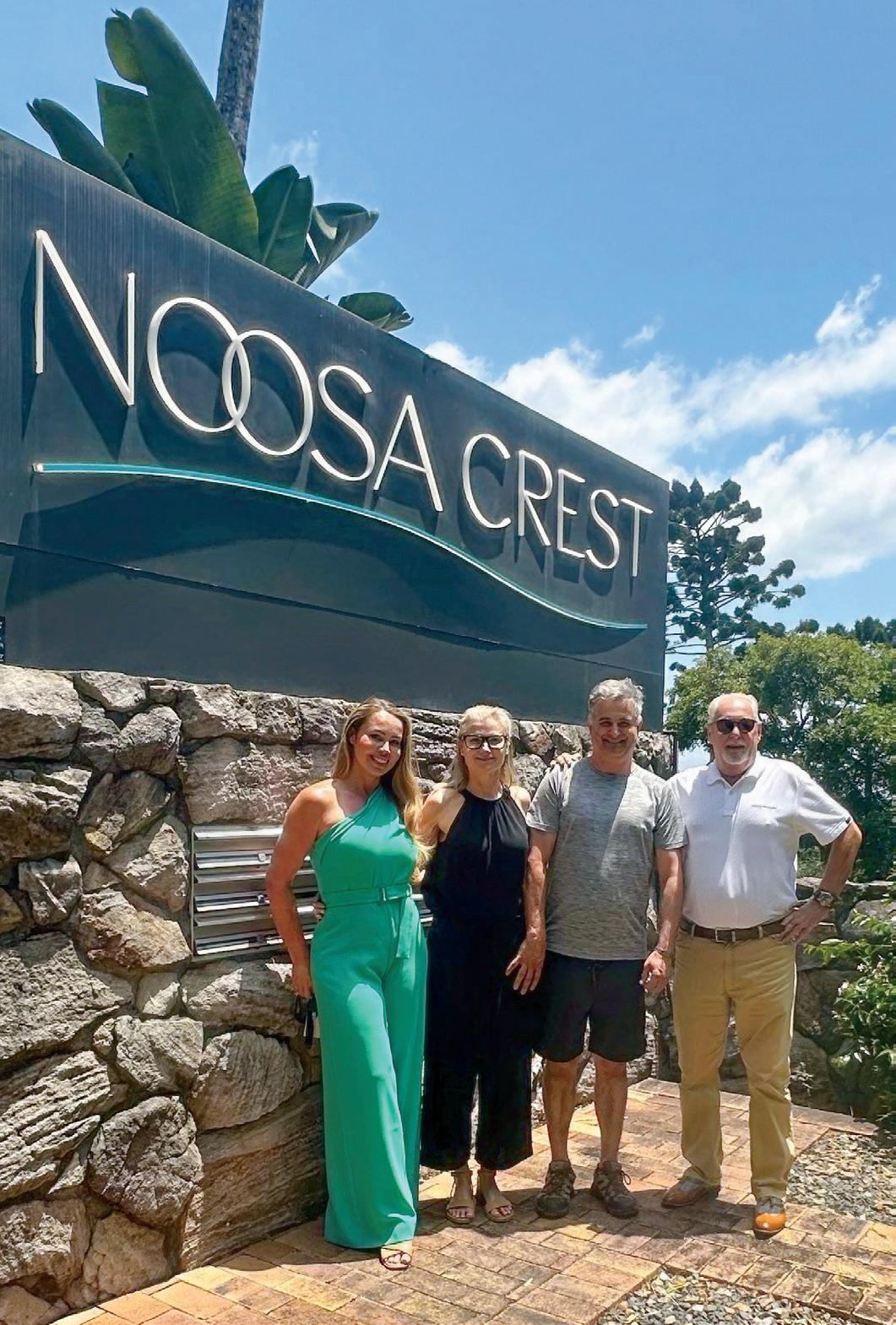
ResortBrokers Sunshine Coast agent Chenoa
Daniel has sold the management and letting rights for Noosa Crest, one of the last privately owned upscale resorts in Noosa.
Set high on Noosa Hill, the 39-apartment 4.5-star resort was purchased in an off-market sale by first-time management rights buyers, Victorian couple Ben and Fiona Lazzar. The sale sees the Lazzars relocate from their home at Balnarring Beach on the Mornington Peninsula to take up residence in Noosa Crest’s three-bedroom manager’s residence.
“The management rights model of a business plus a home has found new appeal and relevance in the current economic climate,” says Ms Daniel, who has sett led nine management rights transactions this financial year alone.
“Noosa Crest is one of Noosa’s most iconic privately owned resorts with luxurious apartments, fantastic guest facilities and private boardwalk down to Hastings Street. The property has stunning, uninterrupted views over Hastings Street and right over Noosaville towards Tewantin.”
“Having enjoyed beach living in Victoria, the Lazzars were looking for a beach home and business combination in Noosa, having both had long, successful careers in other fields.”
“I was delighted to have connected them with sellers Eddie and Anna Cusieri, who are handing over Noosa Crest in an impeccable condition. The Lazzars will be able to enjoy Noosa at its best with a fantastic home and a thriving short-term lett ing business with 30 of the resort’s 39 apartments in the lett ing pool.”
The trusted source for buying Management Rights, Motels and Caravan Parks from all the leading brokers.

River of Gold Motel Hongyu Feng
Maleny Views Motel Luminoglow P/L
Quest Woolloongabba Nova Hotels P/L
Burne Riverside Hotel Travellers Group
New South Wales
Gunnedah Lodge Motel G. Zhang
Tamworth North Holiday Park Rainbow Greenfarm P/L
Cooee Motel Kumar Gilgandra
Victoria Lodge Apartments Zoraan Pty Ltd
1/25 Fern Street Apartment Zoraan Pty Ltd
Western Australia
Bridgetown Caravan Park South West Resorts




Exclusive | Large Brisbane Permanent
Asking Price: $5,040,000
Net Profit: $721,465
Mark Neale 0402 836 622


Exclusive | Holiday Management Rights
Asking Price: $895,000
Net Profit: Contact Agent
Richard O’Connell 0477 013 006






Exclusive | Four Permanent Complexes
Asking Price: $3,676,000 Net Profit: $535,000
Phil Trimble 0418 478 966


Beach QLD Exclusive | Holiday Dual Income ID: 9170
Asking Price: $1,230,000 Net Profit: $208,000
Meagan Monk 0459 693 160






■ Modern & trendy apartments on riverside
■ Body Corporate Salary of $200,000 p.a. (+ GST)
■ Fabulous restaurants, cafes at your door step
■ Spacious 2-bed, 2 bath, 1 car manager’s unit
NETT: $270,000
Qi
$2,300,000 0438 027 771 bobo@propertybridge.com.au
■ 2-bed, 2-bath, upmarket apartment
■ Management agreements topped up last year
■ Gold Coast’s number one beach side suburb
■ Well established business of the highest calibre!
NETT: $255,000
Qi PRICE: $2,100,000 0438 027 771 bobo@propertybridge.com.au


■ Well-presented six-year-old Townhouse complex
■ Agreements have 22 years to run
■ Manager’s home - 4 Bed, 2.5 Bath, 2 Car Garage
■ Return on Investment over 15%
NETT: $328,000 Jim Lowe PRICE: $2,090,000 0403 418 115 jim@propertybridge.com.au

■ Body Corporate Salary $100,000 p.a. + GST
■ 21 years remain on Agreements
■ A ordable manager’s abode. 3 Bed, 2 Bath, 2 Car
■ Short drive to Westfield and theme parks
NETT: $130,000 Jenny Zheng PRICE: $1,090,000 0413 922 580 jenny@propertybridge.com.au

■ A ordable business. Suit first time buyers
■ $64,000 p.a. Body Corporate Remuneration
■ Stable letting pool
■ Manager’s 3 bed, 2.5 bath, 2 car, townhouse
NETT: $90,000 Selina Zhong PRICE: $930,000 0468 886 010 selina@propertybridge.com.au




Property Bridge and team are honoured to receive the ‘Sales Brokerage of the Year’ award for 2024, as presented by the Australian Resident Accommodation Managers Association (ARAMA).
We are a proud ARAMA supporter, and recognise the immense contribution in supporting, educating and advocating for the Management Rights industry.



Be our partner in success and contact us now should you be entering the market to sell or purchase Management Rights

By Grantlee Kieza OAM, Industry Reporter
Management rights in New South Wales and Victoria may not yet rival Queensland’s prominence in the sector, but industry insiders agree that these states present lucrative opportunities for discerning investors. With lower multiples, higher cash flow, and evolving legislative frameworks, the market offers both rewards and challenges. With significant growth in strata-titled properties and evolving legislative frameworks, these states present a mix of challenges and rewards. Experts weigh in on why these regions are att racting attention and how they stack up against the Sunshine State.






Michael Philpott , the owner of Management Rights Sales, has spent over four decades in real estate. He believes the potential in NSW and Victoria is significant for buyers willing to navigate the complexities.
“The opportunities in these states can be exceptional,” Mr Philpott said, citing lower multiples, bigger profi ts, and greater cash flow. “But
it’s a tough segment, requiring balance for those entering and exiting the market.”
He pointed out that management rights in these states remain “very much an unknown secret,” with record-sett ing deals in the upper end of the market. However, he stressed the importance of securing full licences for management rights owners to enable external management and sales. He explained that comparable complexes in NSW typically trade at a multiple two points lower than those in Queensland. Yet, challenges persist, including difficulties selling smaller agreements.
For instance, Mr Philpott highlighted that management rights agreements for several complexes in Merimbula, NSW, were handed back to the bodies corporate because they were too small to att ract buyers. “The requirements for returns on invested funds exceeding 12.5 percent in NSW are stronger,” he said, adding that many contracts are not topped back to the maximum term, creating higher risk profiles for loans.
The UNSW’s City Futures Research Centre Report for 2022 revealed that at least one in six Australians now live in stratatitled properties such as apartments and townhouses. NSW recently became the first state to surpass one million strata lots, reflecting a nine percent growth from 2020 to 2022. For comparison, Victoria has 747,336 strata lots, and Queensland has 498,000.
These figures highlight the growing appeal of strata living, particularly in NSW, which employs more than 3500 people directly through strata schemes. Mr Philpott noted that the capital appreciation of complexes with onsite managers consistently outpaces those without.
“Onsite managers bring a personal touch and value-add services,” he said. “They have skin in the game, owning the residence, the business, and in many cases, the office. Living in the complex allows them to provide unparalleled service.”
Broader perspective on NSW and Victoria






Craig Clark, Director of CRE Brokers (NSW & QLD), echoed Mr Philpott’s observations, noting that businesses in NSW and Victoria present better value than those in Queensland, despite legislative challenges.
“Businesses are selling at multiples of approximately two times the net profi t less than they do in Queensland,” Mr Clark explained. “For example, a complex in NSW showing a net profi t of $500,000 could potentially be purchased for $1 million less than a similar complex in Queensland.”
Mr Clark highlighted a current listing on the mid-north coast of NSW with a net profi t above $600,000 and a four-times multiple as an example of the region’s aff ordability and profi t potential; $600,000, at a 4-x multiple.
This modern complex is expected to att ract attention from syndicates and mum and dad operators seeking to move to a very desirable location, away from the cities.

Col Myers, a leading property lawyer from Small Myers Hughes, highlighted that the lower multiples in NSW and Victoria are primarily due to the shorter terms on agreements in these states.
“In NSW, Building Management Agreements are limited to a maximum term of 10 years. In Victoria, the government introduced a three-year term cap in 2021 on agreements that are entered into by developers when they have majority control of the owners corporation and where they benefi t from the agreement,” Mr Myers explained.
“However, the government — following strong advocacy from ResortBrokers — excluded hotel and resort management contracts from this cap. This means that in Victoria, agreements related to short term operations can still be entered into for 25 years or longer. The same applies to agreements entered into where the developer does not have majority control of voting at owner corporation meetings.”
Mr Myers emphasised the opportunities this creates for buyers seeking stability and long-term investments.
ResortBrokers, a prominent player in the management rights industry, reports a growing portfolio of listings across the two states, with around 10 active listings in Victoria and over a dozen in NSW.


Directors Tim Crooks and Alex Cook told Resort News that the management rights sectors in Victoria and NSW remain relatively small compared to Queensland. For instance, Melbourne has approximately 200 schemes, whereas the smaller Gold Coast boasts over 1000 schemes.
Both Victoria and NSW impose shorter term limits for operators than Queensland, though exceptions exist. In Victoria, these exceptions can enable agreements with longer terms than those permitted in Queensland.
In Victoria, ResortBrokers off ers a diverse range of listings, from small family-run buildings to large-scale complexes suitable
for corporate operators. Prices span from below $500,000 to over $10 million. Their active listings include properties in Melbourne suburbs such as Camberwell, Bentleigh East, St Kilda, Malvern East, West Melbourne, and the CBD.
The portfolio also features regional properties, including an established scheme in Port Fairy, an off-the-plan development in Shepparton — the 67-key Eden Hotel Apartments, now under contract to a Queensland syndicate — and two schemes in Geelong being sold in one line.
The Eden Hotel Apartments, due for completion in the September 2025 quarter, is particularly significant. It represents one of the few off-the-plan transactions since the Owners Corporations and Other Acts Amendment Act 2021 came into eff ect. The Act restricts developers from entering into agreements longer than three years for permanent residential schemes. However, as a short-stay scheme catering to Shepparton’s high-end business and leisure market, Eden Hotel Apartments is exempt from these restrictions and operates under 50-year agreements, providing its new operator with stability and security.
Before the New Year, ResortBrokers is also expected to finalise Geelong’s largest-ever management rights sale. This off market, one-line transaction involves two 4.5-star apartment hotels, comprising over 180 keys in total.


In contrast to Victoria, management rights in NSW have a broader geographical spread beyond Sydney. Between Sydney and the NSW/Queensland border, most towns feature management rights schemes. Coastal regions, particularly in northern NSW, increasingly host shortstay businesses. Significant pockets of management rights are also found on the
Far South Coast in areas like Merimbula.
ResortBrokers has active listings in popular holiday destinations such as Byron Bay, Port Macquarie, Boomerang Beach, Nelson Bay, Terrigal, and Lake Crackenback in the Snowy Mountains.
In Sydney, ResortBrokers primarily deals with older permanent residential schemes

that predate term-limit legislation. In FY23, the company facilitated the sale of the 100-apartment Park Regis Concierge Apartments in Cremorne to Queenslandbased Collective Hotel Management. This deal was notable, as management rights transactions are relatively rare in Sydney. Collective Hotel Management was drawn to Park Regis’ prime location, an annual net profit exceeding $1 million, and a favourable multiplier of approximately 4x. By comparison, a similar property on the Gold Coast might command a 6x or 6.5x multiplier.
While Queensland remains a dominant force in the management rights market, NSW and Victoria offer compelling benefits for investors:
• Lower multiples: Buyers can secure properties at significantly reduced prices compared to Queensland.
• Higher cash flow: The potential for greater returns makes these states attractive for savvy operators.
• Diverse opportunities: From boutique complexes to large-scale developments, both states cater to a range of investment strategies.
However, experts caution that success in these markets requires a proactive approach to management and a keen understanding of the legislative landscape.

As strata living continues to rise, NSW and Victoria present compelling opportunities for investors. With a growing number of Australians choosing strata-titled properties, the demand for management rights is likely to increase.
“The potential is exceptional for those willing to navigate the challenges,” Mr Philpott concluded. “With lower multiples, greater returns, and a focus on valueadded services, these markets are poised to grow in appeal for savvy buyers.”
Despite their legislative differences, NSW and Victoria are increasingly gaining recognition for their unique opportunities. The capital appreciation of complexes with onsite managers continues to outpace those without, driven by the personal touch and value-add services that managers provide. With careful navigation of the challenges, these regions are poised to become even more attractive to investors in the years ahead.
As Michael Philpott aptly concluded, “While NSW and Victoria have room for improvement in terms of legislation, the opportunities they offer for buyers seeking affordable, profitable businesses are exceptional.”

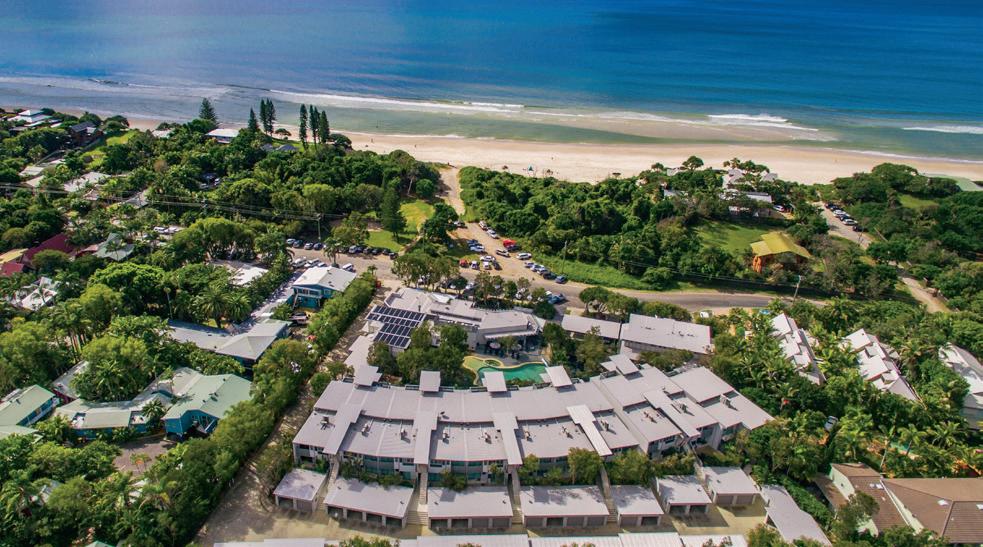



Contact: Michael Philpott, 0433 137 927 michaelphilpott@mrsales.com.au

Contact: Jacqueline Featherby, 0424 497 056 jacqueline@resortbrokers.com.au

Contact: Tim Crooks, 0417 544 562









By Grantlee Kieza OAM, Industry Reporter
After moving from Melbourne to the Gold Coast to pursue a management rights business, Stephanie and Chris Brown are eager to share insights into what they call a “fantastic industry.”
“Moving interstate to a guaranteed income gave us the security and solid foundation to build a great business,” says Stephanie. “On top of that, we now enjoy a work-life balance that lets us be a family.”
Stephanie and Chris manage the Marrakesh Resort Apartments in the heart of Surfers Paradise, a resort that creates wonderful, lasting memories. Marrakesh, named after an exotic Moroccan city nestled at the foothills of the Atlas Mountains, off ers aff ordable luxury accommodation with a serene ambience that brings guests back time and again.
The complex boasts heated pools, tranquil tropical gardens, and a relaxing rooftop sundeck,

all contributing to its unique atmosphere. Stephanie and Chris fell in love with Marrakesh long before they moved in.
“It’s a prestigious building,” says Stephanie. “It’s beautiful, well-regarded, and buying the management rights just felt right.”
Since taking over in August 2022, the couple has undertaken extensive refurbishments.
“In the two years we’ve been here, we’ve waterproofed the driveway and garden beds, extended and waterproofed the rooftop, and laid synthetic
turf over the entertaining area. It looks fantastic,” Stephanie says. “We’ve also washed and repainted the entire building. It’s been a lot of work, but it looks great now. All the maintenance was due. We’ve finished the painting, with just a few awnings and fascia left to repair where trees have intruded.”
Stephanie and Chris came to Marrakesh with prior management rights experience, having managed a complex in Coomera with 57 townhouses since December 2019.
“That was our start in the industry,” says Stephanie.
“My background was in finance, with nearly 10 years at the State Trustee, and Chris was a chef on a ship-refuelling tanker in Melbourne. When we had kids, we started a catering business, but we were working 16-hour days. We wanted a change.”
Management rights off ered them the opportunity to run a hands-on business with flexible hours, allowing more time with their children.
“It really appealed to us,” says Stephanie. “Running a large complex is demanding, but we
see our kids a lot more than when we were in catering. Our son is now 12, and our daughter 10. We missed so much of their early years, but that’s changed for the better.”
They first heard about management rights while still in Melbourne and decided to attend a seminar on the Gold Coast to learn more.
“It sounded very promising, so we made the big move with our two young children in August 2019,” says Stephanie. “We took over the Coomera complex in December that year.”
Shortly after sett ling in Queensland, COVID-19 struck, bringing major changes to the holiday market and rising real estate values. At Coomera, a permanent lett ing complex, the eff ects were felt strongly.
“At Coomera, we started with a healthy lett ing pool of 43 townhouses,” Stephanie says. “But with COVID and people moving up to Queensland, that’s dropped to 26, with many new owner-occupiers. It’s almost impossible to regain those units because interstate movers need places to live.”
As the letting pool shrank, the couple sought additional income. Then, the opportunity arose to purchase the management and letting rights at Marrakesh.
“It appealed to us right away,” says Stephanie. “There’s prestige in the building, and it’s an iconic Gold Coast destination. We were thrilled when we had the chance to take on the management rights here.
“Living in a two-bedroom apartment with two kids isn’t ideal, but the location makes up for it. It’s close to the beach, and there are better schools for the kids.” They now live onsite, work full time, and employ people to handle gardens and maintenance at Coomera.
A unique lifestyle opportunity
Marrakesh is a landmark building with stunning views of Surfers Paradise. A short stroll down Surf Parade takes guests to pristine beach sands or the

tram to explore the Gold Coast’s world-class shopping, Star Casino, cafés, and restaurants.
There are 143 well-appointed, modern apartments in the complex.
“We have a mixture of occupants,” says Stephanie. “There are permanent tenancies
and a few managed by outside agents. We’ve got some holiday units, and the rest are owneroccupied. We manage 24 in the holiday letting pool and 24 in the permanent lettings. They all keep us very busy.”
Facilities at Marrakesh include two heated pools, a firstclass restaurant, an amazing
rooftop entertaining area, and barbecue facilities. In addition to the sparkling pools, tropical gardens, and rooftop sundeck, there’s a well-equipped gym, spas, and a sauna.
On the ground floor, Rudy’s Real Foods Café/Restaurant offers a tasty, fully organic menu with vegetarian and vegan options.


“The restaurant is independent of our management,” says Stephanie. “It’s rented separately, but it’s such a great asset for Marrakesh and a convenience for guests. The restaurant has a great reputation, and
guests don’t have to travel far — just a lift ride away.
“The Gold Coast off ers great value for holidaymakers, and we’re always off ering special deals. You can enjoy a luxury holiday in a beautiful building like this without a huge price
tag, compared to other places in Australia or around the world.”
After fi ve years in management rights, Stephanie has

become a guest speaker at the seminars they attended before entering the industry.
“My advice is to get to know your body corporate and your caretaking agreement well,” she says. “Spend as much time as possible with the outgoing manager, as their experience and advice are invaluable.
“It’s vital in this business to form good relationships with the body corporate and owners. And I think it’s essential to work with industry experts — accountants, lawyers, and finance brokers who specialise in management rights — because they know what they’re doing.
“We’ve worked with Mark Ryall from MRM Finance, and Count Accounting handles our financials. For legal matters, we’ve used Small Myer Hughes and Pevy Lawyers, who are experts in their field.
“Management rights can be complex when you start, but we love the work-life balance it gives us as a family, and we’re excited to be building our own successful business.”
SSKB’s Head of Operations, Charlotte Divall, is returning to where her journey began — Marrakesh in Surfers Paradise. Taking on the role of community manager, Charlotte brings 16 years of strata management experience and an in-depth knowledge of this iconic property.
Charlo e began her career at Marrakesh, the 143-unit complex on Surf Parade, in 2008.
“Marrakesh was one of my very first clients, so I know this building inside and out,” she said. “Over the years, I’ve worked closely with its previous managers and commi ees, and I’m thrilled to now partner with Stephanie and Chris Brown, who have managed Marrakesh since 2022. It’s an exciting opportunity.”
Charlo e’s experience spans local government, the private sector, and large-scale strata complexes. She excels at guiding clients through complex issues, achieving balanced outcomes, and fostering collaboration among diverse stakeholders.
Since joining SSKB, Charlo e has built a reputation for professionalism and results, managing complex portfolios and helping commi ees meet financial goals. She was appointed General Manager for the Gold Coast and NSW in 2017.
Charlo e’s approach to management and le ing rights centres on “the triangle of management.”
“To succeed, you need three elements: a cohesive commi ee, great building managers, and a proactive body corporate manager,” she said.
Her role involves supporting management rights owners with building






At SSKB, we believe success is built on strong relationships and a shared commitment to excellence. As a trusted partner, we work handin-hand with building managers to simplify strata management, foster collaboration, and create thriving communities. With a focus on innovation, proactive support, and unmatched expertise, we’re here to support your journey and help you achieve exceptional outcomes.



manager reports, ensuring creditors are paid promptly, and maintaining strong contractor relationships — key to successful operations.
“We also ensure compliance through inspection registers and professional oversight.”
Charlo e is eager to leverage SSKB’s long-standing relationship with Marrakesh.









“Management rights go beyond caretaking and holiday le ing. They involve trust accounts, government regulations, and administrative procedures, all of which SSKB assists with,” Charlo e said.










“Having SSKB’s history here is a huge advantage, and I’m delighted to now work directly with Stephanie and Chris to keep Marrakesh at its best.”






























































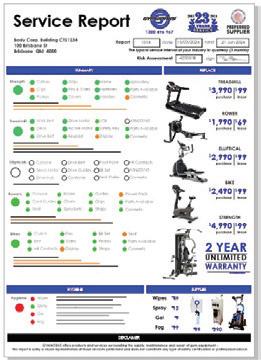






















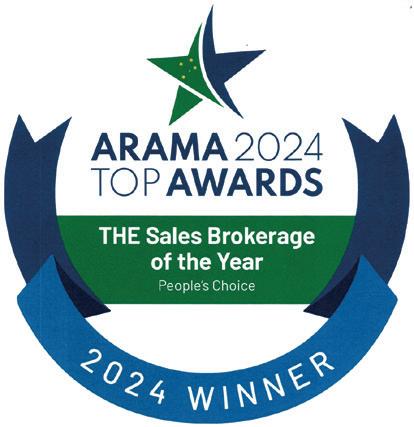























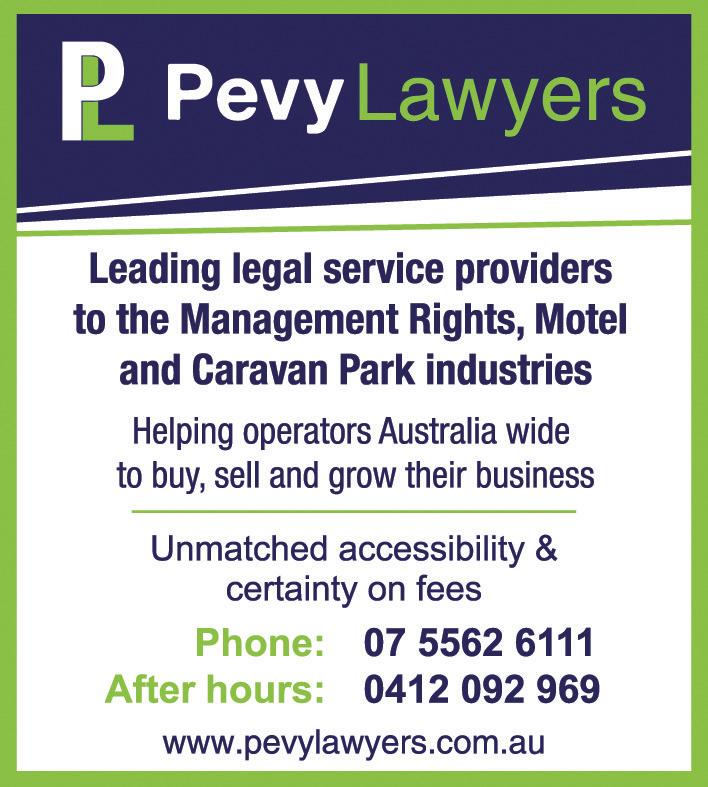









/ MONTH



Delivered & Installed
Disposal of Old Equipment

Lifetime on Repairs











